
81 minute read
Status of Academic Programmes
Baze University is synonymous with excellence and quality education. The University provides: state-of-the-art equipment in all laboratories; comfortable, convenient, and conducive facilities in Lecture Rooms and Auditoriums; 24/7 internet-serviced Libraries; highly qualified academic staff that give students rich and robust experiences in chosen fields, and a superb ICT platform. The capacity and capability of the ICT infrastructure in the University is a huge success story that sister institutions have come to understudy. Through remote learning and the conduct of online classes, Baze University successfully completed two Semesters during the COVID-19 Pandemic Lockdown. Our students never lost any time in the pursuit of their academic goals as the University took advantage of its robust digital technology platform to connect with students and staff, provide and effectively monitor lectures as well as conduct examinations. To cap all these, the University has a good academic standing for all its programmes at the National Universities Commission (NUC) - the Agency that is statutorily empowered to regulate all university education programmes and activities in Nigeria. As of October 2020, there were forty-nine (49) approved programmes which run concurrently either at the Undergraduate (UG) or Postgraduate (PG) levels, with four-four (44) situated in different Faculties while five (5) are attached to Service Departments. There are 36 Academic Programmes at the Undergraduate level while 13 are at the Postgraduate level. As at date, almost all the programmes in the Faculties have attained Accreditation, while some new ones are awaiting NUC’s Accreditation Visits. The information above is presented in the Table below:
STATUS OF ACADEMIC PROGRAMMES
S/N Faculties Number of Programmes
1 2. 3. 4. 5. 6. 7. Management and Social Sciences Computing and applied Sciences Law Engineering Environmental Sciences Basic Medical Sciences College of Medicine (MBBS)
TOTAL UG
10 5 + (*2 in service units) 1 6 3 + (*3 in service units) 5 1
36
*Service Units • Centre for Foundation & Interdisciplinary Studies • Biochemistry
PG
8 4 1 Not Offered Not Offered Not Offered Not Offered
13
* Dr Rukayyatu A. GURIN, mni is the Director, Academic Planning.
Ferdinand A. OM’INIABOHS*
Introduction
Baze University in 2020, achieved a lot of progress despite the unprecedented challenges created by CORONAVIRUS PANDEMIC. The Faculty of Basic Medical Sciences which hitherto had two Departments (Anatomy and Physiology) now has a total of five. Three new Departments; Public Health, Medical Laboratory Sciences and Radiography & Radiation Sciences were approved by the National Universities Commission (NUC) in the first quarter of 2020. Baze University was also given approval to start the training of medical doctors in the Faculty of Medicine and Surgery.
The Medical students in the pre-clinical stream of 2nd & 3rd year levels and those admitted into the three Departments of Public Health, Medical Laboratory Sciences and Radiology & Radiation Physics would all be serviced by the Basic Medical Sciences Departments of Anatomy, Biochemistry and Physiology. However, the first year or 100 Level for all these students would be spent in the Applied Sciences of Biology, Chemistry and Physics.
EQUIPMENT GALORE
The Departments in the Basic Medical Sciences received an array of sophisticated equipment for the training of students; these include the following:


ANATOMY

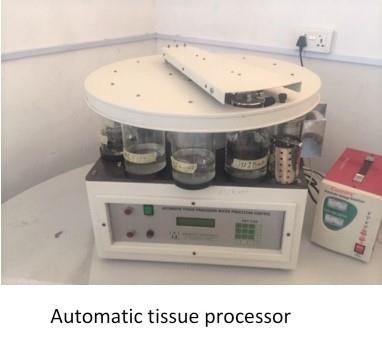



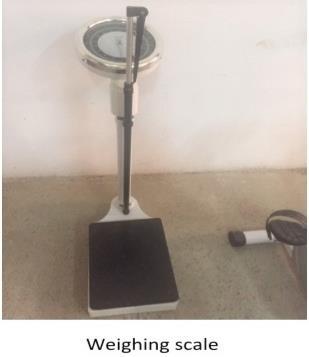
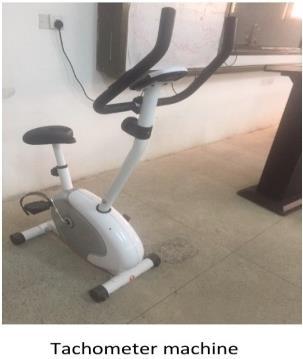

PHYSIOLOGY

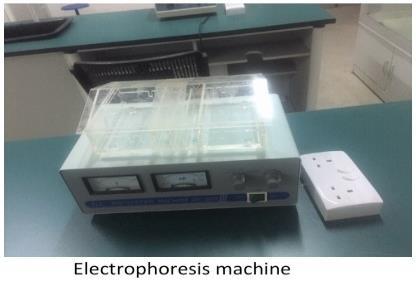

Recruitment of Quality Staff
In early 2020, the Management of Baze University recruited a batch of middle cadre staff for the Department of Anatomy and Physiology; these are lecturers of good standing and quality education who shall be able to impart knowledge to the Medical and Allied Health sciences students. Consequently, the sophisticated equipment in the Departments of Anatomy, Biochemistry and Physiology are handled by experienced Technologists to ensure robust experiences and best quality education for students.
Baze University Teaching Hospital
The Management of the University has embarked on the construction of the Baze University Teaching Hospital (BUTH) at the north-western end of the campus and it is expected to be commissioned by the first quarter of 2021. The Hospital is uniquely designed to accommodate 150 beds and will operate under a Hospital Management Board to be chaired by a Chief Medical Director (CMD) who is expected to implement policies and programmes of the Board. The CMD and his team will be supported by a Medical Advisory Committee led by a Chairman with the acronym C-MAC. BUTH is also expected to liaise with the Federal Ministry of Health while the Faculty of Basic Medical and Health Sciences would work closely with NUC and the Federal Ministry of Education. Meanwhile, in order to ensure that the medical students registered for the course are given required experiences, Baze University has signed a Memorandum of Understanding (MoU) with FCT Hospital Management Board for the utilization of the District and General Hospitals in Abuja Metropolis.
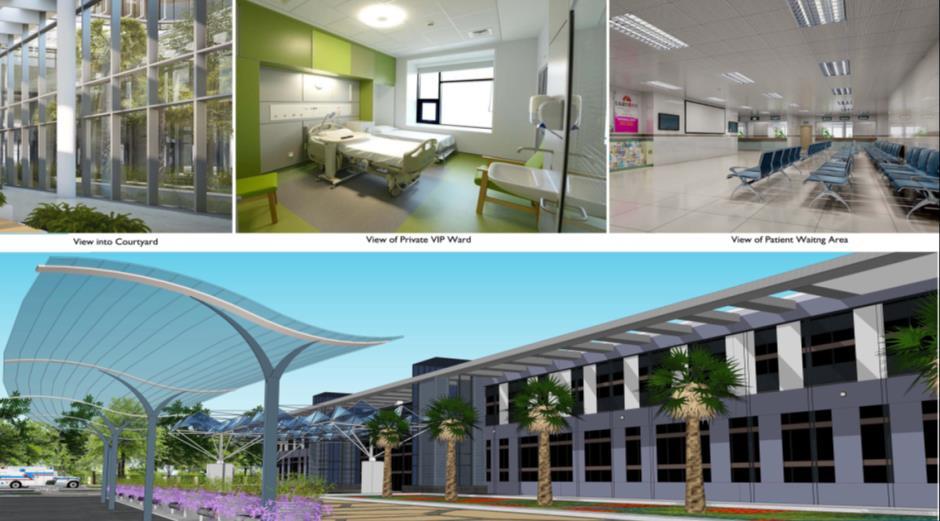
Commencement of Study and Approval From Professional Bodies
Admission of new students into the 100 level Basic Medical Sciences Programmes commenced in September 2020 and the Faculty is expecting visits from the Professional Bodies. Medical and Dental Council of Nigeria (MDCN), the Radiographers Registration Board of Nigeria (RRBN) and the Medical Laboratory Science Council of Nigeria (MLSCN) are responsible for the professional registration and licensing of Graduates in Medicine, Radiography and Medical Laboratory Sciences, respectively at the end of their programmes.
Prospects
Once the BUTH takes off, the Faculty will liaise with Management to seek NUC’s Approval for the establishment of other professional courses such as Dentistry and Pharmacy with the terminal Degrees of Bachelor of Dental surgery (BDS) and Doctor of Pharmacy (D.Pharm).
*Prof Ferdinand A. OM’INIABOHSis a Professor of Anatomy & Cell Biology and the Dean of the Faculty of Medical Sciences.
WASTE TO WEALTH: AN APPROACH TO AMELIORATE FOOD INSECURITY Patience. T. FOWOYO*
Introduction
Wastes are residual usable or unusable products obtained after primary use. Wastes are generated in several ways: during extraction and processing of raw materials into intermediate and final products; during consumption of final products, and through other human activities. Wastes are categorized into industrial, commercial, domestic, and agricultural wastes. Agricultural wastes are unwanted or non-commercially viable materials produced wholly from agricultural operations as in the cultivation of crops or raising of animals. Agricultural waste also known as agro-waste, comprises of: animal waste (manure, animal carcasses), food processing and crop waste (corn stalks, sugarcane bagasse, drops and culls from fruits and vegetables, pruning of tree, shrub or bush) and toxic agricultural waste (residual chemical pesticides). The by-products from processing and agro wastes are often discarded as refuse. One of the adverse effects of discarding this waste is pollution of the environment with resultant detrimental and debilitating impact on human health.

The rapid increase in the world’s population coupled with urban migration has resulted in an increased demand for food which in turn has led to the production of large amounts of agricultural wastes, both at the farm, village, municipal and city levels. In developing countries (Nigeria inclusive) the bulk of agricultural produce is transported to urban markets in raw farm-form, and when they are not sold, they snowball into large deposits of wastes in the markets, around homes, slums and in refuse dump sites. A continual wastage of food produce in this manner adds to food insecurity. Globally, reliance on agriculture is the major tool in ensuring food security. Food insecurity simply represents the lack of access to adequate food; it could be temporary or chronic. Chronic food insecurity arises from a lack of resources to produce, procure or acquire food; the diet is persistently inadequate. A country is food-secure when majority of its population have access to food of adequate quantity and quality sufficient for a healthy life. In order to be food-secure, food must be available to the people in a quantum that meets acceptable level of nutritional standards (requisite calories, protein and minerals needed by the body), the people must possess the means to acquire, coupled with reasonable continuity and consistency in its supply. The Agricultural sector is bedevilled with challenges that jeopardize citizen’s ability to sufficiently cater to the food needs of the populace thereby leading to food insecurity. These challenges include post-harvest losses, storage, shelf life of perishable crops, and the logistics of movement from farm to table. It is therefore imperative to explore ways to produce crops and grow livestock using agrowastes in ways that will ensure sufficiency, affordable and nutrition.
Agro Waste to Boost Food Security
Several concerted efforts are being made at converting wastes into useful products. Useful products that have been produced from wastes include biofuels, animal feeds and organic fertilizers. Agricultural wastes are widely available, renewable, and virtually free; hence they can be an important resource. However, in developing countries, many of the agricultural wastes are largely under-utilized, left to rot or openly burned in the dump sites and fields. In the Department of Biological Sciences at Baze University, our objective in agro-research is to repurpose agricultural waste into a resource that can be utilized. This fuelled the passion to encourage a research that will convert agro-waste into desirable products. Our recent research invention is the production of oyster mushrooms from agricultural wastes. In Nigeria due to high costs, many families do not include meat in their diets because of affordability, and other individuals due to their susceptibility to heart related diseases avoid the consumption of meat especially beef with a high cholesterol level. Mushrooms are a better alternative to meat; they are affordable and are a rich source of protein with no risk of heart related diseases.
Oyster mushroom Hauwa growing mushrooms in the laboratory


Hauwa Ibrahim in 2019, a 400-level student, was encouraged to carry out a research utilizing locally sourced agro-waste products (tiger nut chaff, sugarcane bagasse and saw dust) to cultivate edible mushroom in the laboratory. She observed a higher yield of mushrooms with the use of sawdust as compared to the other agro-wastes. It was also discovered that the protein content (48.1%) of the mushrooms cultivated in our laboratory was almost the same as that in red meat (52.2%). This shows that mushrooms produced from this agro-waste can be a suitable alternative source of protein.
Mushroom grown on sawdust Mushroom grown on sugarcane bagasse



Mushroom grown on tiger nut chaff Medicinal Value of Oyster Mushroom
Mushrooms are edible fungi with high nutritional and medicinal value. Some species of mushroom are regarded as therapeutic foods due to their anti-carcinogenic, anti-cholesterolemic and anti-viral properties. It has been reported that mushrooms can maintain the blood cholesterol at the optimum level preventing cardiovascular diseases. According to researchers many of the compounds in the mushroom can prevent or treat certain health conditions such as asthma, atherosclerosis, dermatitis, diabetes, hepatitis, high blood pressure and inflammatory bowel disease (IBD).

Nutritional Benefits of Oyster Mushroom
Cultivated and wild mushrooms are known to contain reasonable amounts of protein, carbohydrate, minerals, dietary fibre, and vitamins with low levels of calories, sodium, fats, and cholesterol. Oyster mushrooms are considered a good source of superior quality protein, with well distributed essential amino acids. Therefore, mushrooms are an excellent food source to alleviate malnutrition in developing countries.
Economic Importance of Agricultural Wastes
Agricultural wastes can be used in producing healthy crops and raising healthy livestock. This will reduce the cost of crop production and livestock farming thereby making food affordable and available. Products derived from agricultural wastes are of high economic value. For instance, mushrooms, and snails are grown using agricultural wastes. These agricultural products are in high demand and can also be exported to boost forex. Agricultural wastes being organic when utilized in growing crops or raising livestock always produces highly nutritious food. When these foods are consumed by man who represents the greatest resource on earth, economic value increases. If the workforce of a nation is healthy, the greater will be their productivity. The greater the productivity of the workforce, the more the economic value that is accruable to that nation. The process of growing crops or raising livestock using these agricultural wastes will require human labour. In Nigeria, many people are unemployed or underemployed and the use of agro-wastes as a source of livelihood would provide employment and invariably income for the unemployed. Micro and medium scale businesses can be created along this agricultural value chain which can also provide opportunity for self-employment and cascade into improved gross domestic product (GDP), economy and food security. Overall, agricultural wastes can be a valuable resource for improving food security, using this method of food production.
*Dr. Patience T. FOWOYOis an Associate Professor and Head, Department of Microbiology in the Faculty of Computing & Applied Sciences
Faculty of Management and Social Sciences - Sustaining Partnerships Amidst the Uncertainties of Year 2020 by Osita AGBU*
The Faculty of Management and Social Sciences (FMSS) is the largest and most diverse at Baze University. It has some of the most versatile, and experienced lecturers an academic environment can wish for. FMSS currently has the following Departments; Accounting, Banking and Finance, Business Management, Economics, International Relations and Diplomacy, Marketing, Mass Communication, Political Science and Public Administration, Psychology, Sociology and Anthropology. The Faculty leverages on partnerships with the private sector and encourage students to explore same to maximum benefits.

The Department of Accounting, Banking and Finance
The Department of Accounting, Banking & Finance was established in 2011 with a focus on teaching and research, local and foreign accounting procedures and banking and finance issues. The academic modules in the Department are designed to produce graduates who would fit into a broad spectrum of jobs in national and international private and public sector agencies. This is supported by a retinue of robust digitally compliant and literate staff strong in the use of computer application tools including Oracle, Cisco, Cyberoam, Huawei, Petex, Quick Book, IBM, and Peachtree. The Department leverages on knowledge, innovation, technology, and entrepreneurship as the hallmark of positive development, and nothing is left to chance in the process of educating the students. The Department received a delegation from the Association of National Accountants of Nigeria (ANAN) in February 2020 on a collaboration visit towards improving the discipline and profession. Some other activities of the Department in 2020 are shown in the pictures below.
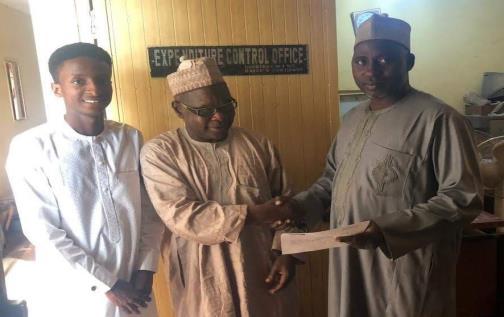
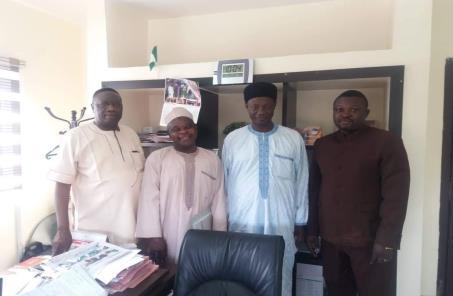
SIWES Inspection Visit by the HOD, Dr. Adamu Zango (middle) to Accounting Students serving in the Ministry of Finance, Sokoto State

SIWES Inspection Visit by the HOD to Usman Muhammad Usman (a Student) serving at the NNPC, Kaduna
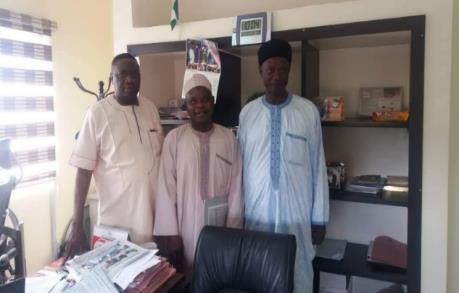
Accounting Students attend ACCA Workshop in Abuja
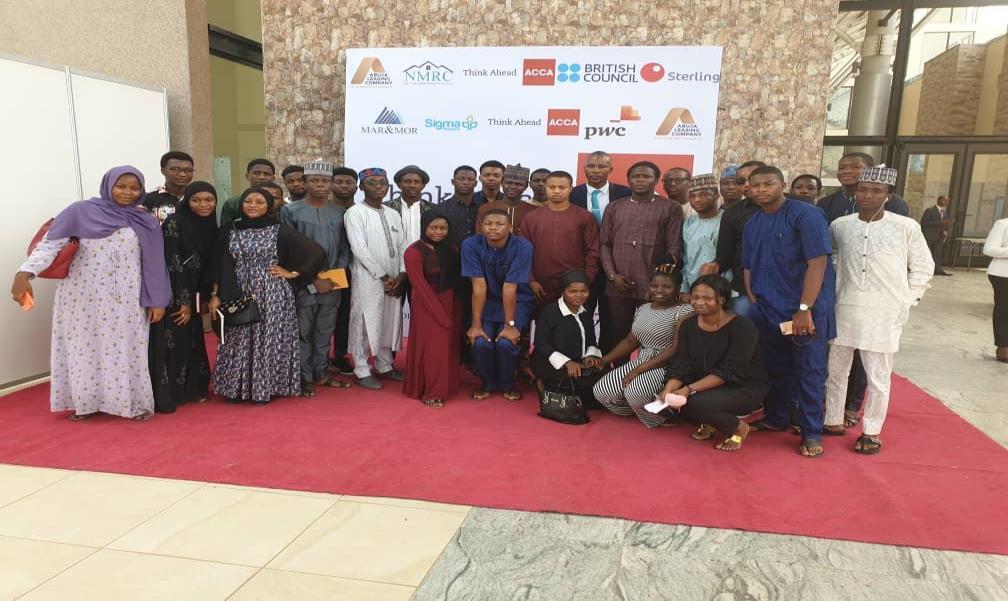
The Department of Economics was established in 2011 and has consistently produced graduates of economics that compete favourably with their peers from similar institutions all over the world. There has been a steady growth in student enrolment and staff population with many from diverse background. The first B.Sc Economics Degree was awarded in 2014, and since then over 100 graduates have been produced with 2018 and 2019 recording First Class graduates back to back - a clear attestation to the quality of the teaching staff. The post graduate programme commenced in 2019 and the Department is on course to produce the first set of M.Sc Economics graduates in 2020. Graduates of the Department are groomed to apply sound economic theories to everyday life, and develop thorough appreciation of national and global socio-economic environment of any society. It is well positioned to produce graduates that contribute meaningfully to the public and private sectors of the economy.
The Department of Marketing has a programme that prepares students for the challenges inherent in marketing and sales sector of the national economy. Marketing is critical to understanding the dynamics of trade in the world. The Marketing Programme which has been fully accredited by NUC inculcates the spirit of entrepreneurship in the graduates and positions them for leadership in industry, commerce, public service, and private organizations.
The Department of International Relations and Diplomacy (IRD) is a popular department in the University and offer students a unique blend of theory, practical knowledge and skills that expose students to the flexibility and impact of politics, economy, and culture on the policies of sovereign states. Over the years, the Department has attracted high caliber lecturers; many of them experienced technocrats, retired military personnel and established academics. There is no gain saying that our students have been better for this as they imbibe not just theories, but also practical experiences garnered from these illustrious lecturers. The Department exposes students to the basics of governance, multilateralism and diplomacy and the student population have been on a steady rise. The Postgraduate programme which commenced in 2018 has grown astronomically within a short period of time, thanks to its dedicated staff.
The Department of Business Management leverages on teaching and research that focus on local and international management issues with courses designed for graduates who would fit into a broad spectrum of job roles in the private and public sectors. Robust Courses in Management, Marketing, Accounting, Economics, and Finance are designed to help students develop quantitative, analytical, and critical skills needed to succeed as managers across all sectors. In the recent past, the department successfully organized several field trips to expose students to real-life activities in close relationship and co-operation with the private and public sectors, as well as other institutions of higher learning, locally and internationally. Field trips are organized in partnership with these organizations to expose students to real-life activities. As an academic destination in management, the Department runs very popular postgraduate courses in M.Sc and MBA Programmes in Management.
At the Department of Mass Communication, the primary responsibilities of teaching, research and community service have been pursued with a virtuous zeal, resulting in the generation of enthusiastic students, eager to take on the real world. The research activities by staff have led to publication of referenced academic articles in books and journals. The Department has made prominent contributions in community service, as highlighted below: • Organize internal and external media coverage for university events and students are allowed to participate as hands on practical demonstration. • Participation of staff and students in community organized symposium, workshops, seminars, etc, for capacity building. • research partnership with Media Trust Limited, publishers of Daily Trust to develop a template that will periodically assess the performance of the company’s lead publications with a view to enhancing contents and professional quality. • Partnership Agreement with Code for Africa for collaboration on Digital Journalism Training.
MOU was recently signed between Baze University and the Organization.
The Department of Political Science and Public Administration had a year filled with numerous activities: • key participant at the 17th Daily Trust Dialogueon January 9, 2020 and the Theme was Twenty years of Democracy in Nigeria: Strengths, Weaknesses and Opportunities. Many of our senior staff and students were in attendance. • Departmental Seminar on “Influence of the State-Local Government Joint Account System on
Public Service Delivery in Nigeria: A Case Study of Awgu Local Government Council”, by Dr.
Chukwuemeka Okafor (a senior staff on research leave.) • attendance at the First Lady’s (Aisha Buhari) event to promote girl-child education in Nigeria.
Former first ladies that attended the event included Turai Yar’Adua, Patience Goodluck Jonathan and Maryam Abacha. • Faculty Seminar Series in February 2020, where Dr. Hakeem Baba-Ahmed presented a Paper titled “Persuasion and Negotiation: Lessons from 12 Angry Men”. Presentation highlighted the value of persuasion and negotiation as strategies in dealing with complex and challenging situations.
The Department of Psychology had a rich and rewarding year. Our students have continued to show progress and in-depth understanding of knowledge as attested to by the External Examiner’s Report. Some of the progress made in the year under review were: • Attainment of Full Accreditation status of the Psychology programme.
Acquisition of highly sophisticated Psychological Tests Instruments including: Wechsler Adult Intelligence Test (WAIS), Minnesota Multiphasic Personality Inventory (2) (MMPI 2), Sixteen Personality Factors (16PF), Beck Anxiety Inventory (BAI), Beck Depressing Inventory (BDI), Locus of Control Inventory (LCI), Rorschech Inkblot, and One-way-mirror and Thematic Apperception Test (TAT). These tests have been invaluable in enhancing the quality of research projects of our students.
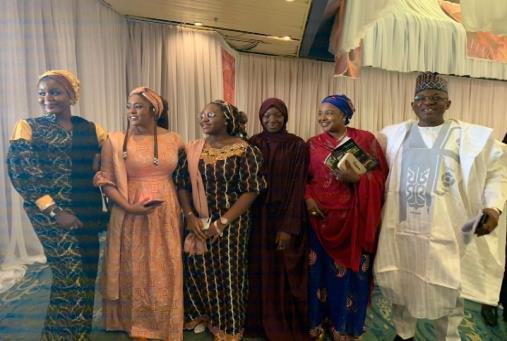
Students of Political Science & Public Administration and International Relations & Diplomacy at the First Lady’s Event.

Appreciation
It is indeed noteworthy that in spite of the harsh effects of COVID-19 lockdown on all activities in the country for 2020, the Faculty of Management and Social Sciences with the cooperation of staff, students and the University Management has continued to run all its programmes to the satisfaction of all. I use this opportunity to appreciate our indefatigable staff for their sacrifices, the university management for providing an enabling environment and more importantly, the parents of our students for putting their trust in us.
*Prof. Osita AGBU, FNSIA, FCIA is the Dean, Faculty of Management and Social Sciences.
FACULTY OF ENGINEERING: Pathway to Excellent Engineering Education Nuradeen Labaran TANKO*
The Faculty: Tall Oak from little Acorn
Baze University started admitting students in 2011, but it was not until 2015 that the National Universities Commission (NUC) granted approval to admit and register students for Engineering Programmes; Mechanical, Petroleum and Gas, Civil, Electrical and Electronics, Telecommunications, and Computer Engineering. Thereafter, three programs (Electrical & Electronics, Computer and Telecommunications Engineering) were put under one Department, but students were allowed to their areas of choice.

The Faculty of Engineering started with 8 students known as the famous eight whose choice of programmes cut-across all the disciplines of Engineering. This was an encouragement because we were happy that Baze University could attract students to all its Engineering programmes, but it was a challenge as it meant the University would have to provide infrastructure and manpower for all the Engineering programs concurrently. The University Management rose to the occasion and provided manpower and equipment for all the Departments in the Faculty and this ensured that our students were prepared for the “Future of Engineering” practice nationally and globally.
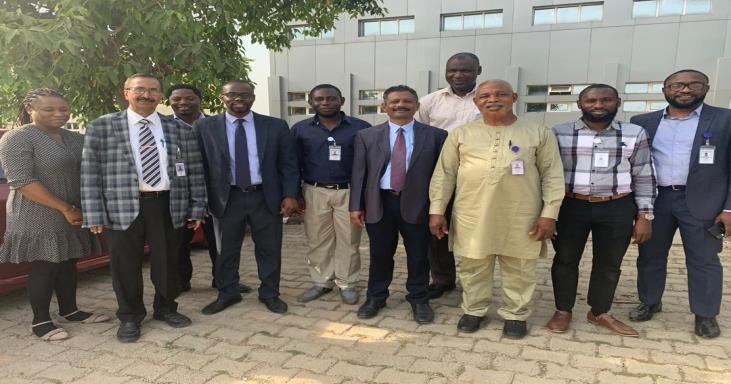
The Dean and Senior Members of the Faculty of Engineering
Current status
The Faculty of Engineering currently has over sixty Lecturers across the four Departments and more than 70% of them possess higher tertiary degrees with significant years of experience in and outside Nigeria. The majority of these staff are in full time employment with the University. The Faculty of Engineering in recent months took the delivery of high-end laboratory and workshop equipment that will enhance students’ knowledge of basic and fundamental concepts in the various fields of Engineering. All the Engineering Programmes have full Accreditation status from NUC and the preliminary feedback from the Employers of our graduates has been positive.

The Faculty of Engineering within this period of its existence has recorded several achievements and received many accolades based on the performance of students and staff in national and international competitions. Some of our students have excelled in Robotics and Quiz Competitions winning Scholarships and Prizes. Several staff have won prizes from the Society of Petroleum Engineers (SPE) for their academic and research contributions and for mentoring activities. The Faculty of Engineering has also supported projects within the University, an example is the Baze University Teaching Hospital (BUTH) Project where staff of the Faculty provided technical support in the Design and supervision of the Project.
Programmes offered in the Faculty
The Faculty of Engineering offers six academic programmes: Civil Engineering, Computer Engineering, Electrical and Electronics Engineering, Mechanical Engineering, Petroleum and Gas Engineering and Telecommunications Engineering. Each programme provides a unique experience to the student delivering a balanced mix of theory and practice to develop robust competencies and skills. Admission requirements into any of the engineering programs are as follows: • 100 Level - UTME scores as may be approved by Senate and five (5) O' level credit passes in no more than two sittings in SSCE (or equivalent) including English Language, Mathematics, Physics, Chemistry and any other science subjects. • 200 Level - at least two (2) A' Level passes in Mathematics and Physics: OND (Upper Credit) with Distinction in Mathematics or HND (Lower Credit) in related engineering course. • 300 Level - HND (Upper Credit) in related engineering with Distinction in Mathematics.
Civil Engineering:
The mission of the Department is to provide civil engineering education through innovative teaching and research, designed at producing a new generation of highly motivated, competent, skillful and innovative professionals with a burning desire to take on the developmental challenges of Africa. Our philosophy is to deploy existing knowledge in science and technology to produce civil engineers who would function effectively in the public sector and the industry in the planning, design, construction and management of facilities. These facilities include highways and roads, airfields, waterways, railways, and traffic control systems; buildings and bridge structures; energy and communications structures; foundations; hydraulic structures; water resources development; water supply, waste disposal and treatment; land reclamation and erosion control, and other civil engineering structures. The Civil Engineering programme is industry focused and designed to enhance employability in the various specializations to meet the significant infrastructure deficit of the nation.


Civil Engineering Students Conducting Experiment on the Soil Using Hot Air Oven (left) and CBR Machine (right)
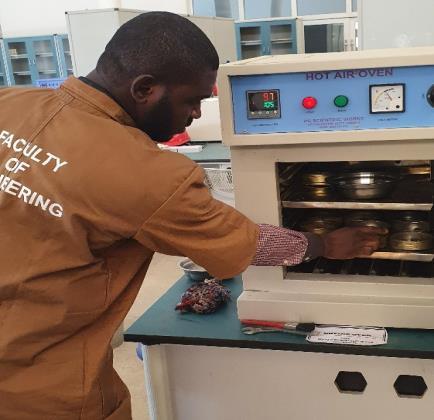
One of the Civil Engineering Laboratories at Baze University
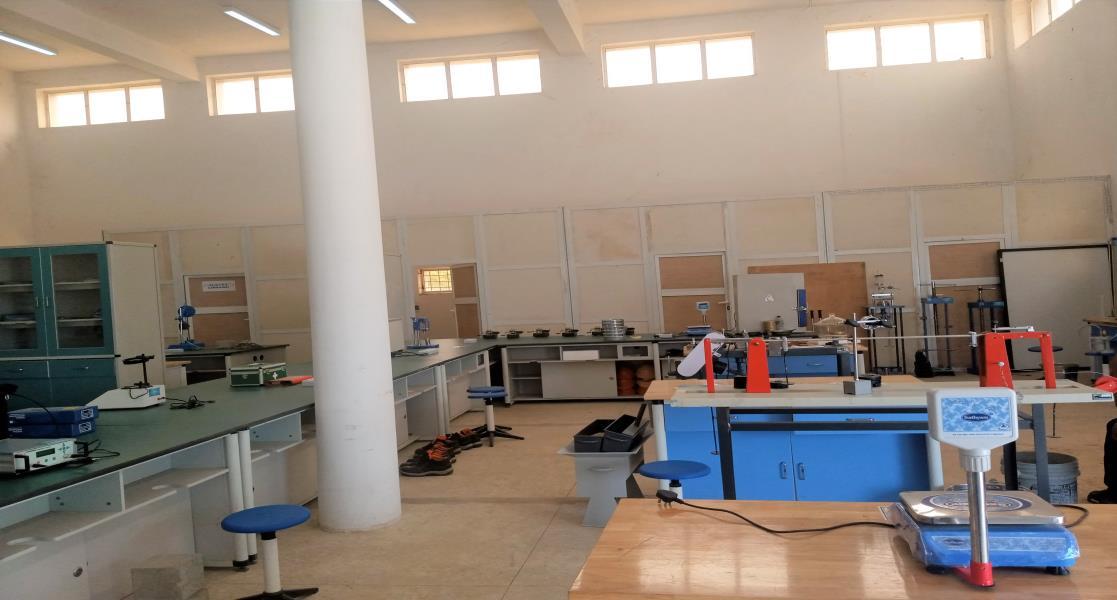


Electrical Electronic and Computer Engineering : Electrical Electronic Engineering :
The programme is designed to meet the needs of global technology and electronics. The programme consists of lectures, laboratories, projects, and practical training in the industry. There is a mentorship scheme that ensures that every student is properly guided and tutored to ensure for optimal performance. This strategy provides students with required expertise needed to secure professional-level employment in related industries. On the successful completion of a Degree programme, students may specialize in the following areas: Power Systems and Machines, Electronics and Communications, Computers and Control. Electrical Engineers are open to numerous opportunities in the technology industry, where they evaluate electrical products and ensure components meet specific codes and standards. They are also involved in Equipment testing, troubleshooting and maintenance, power generation and distribution, renewable energy, manufacturing and construction, rail, telecoms, and the construction industry.
Computer Engineering:
The philosophy of the Computer Engineering programme is to produce graduates of high international academic standards, with adequate theoretical knowledge and practical skills and who will be of immediate value to the nation's fledgling computer industry. Computer Engineers work with hardware and software, ensuring that the two are seamlessly integrated and properly functioning. Computer Engineers focus on innovations; making computing systems safer, faster and more powerful. At the career level, there are two main avenues: hardware and software engineering. Hardware engineers focus their skills on computer systems and components, designing microprocessors, circuit boards, routers, and other embedded devices. On the software side, these engineers create, test and debug programmes and applications that run on computers, mobile device and much more.
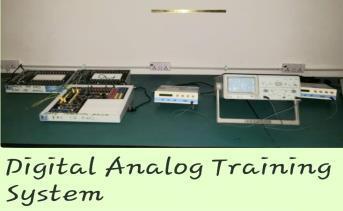

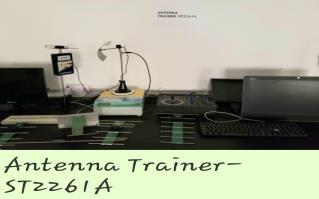
An Electrical Engineering Student who designed and built a Drone is supervised by a Tutor.





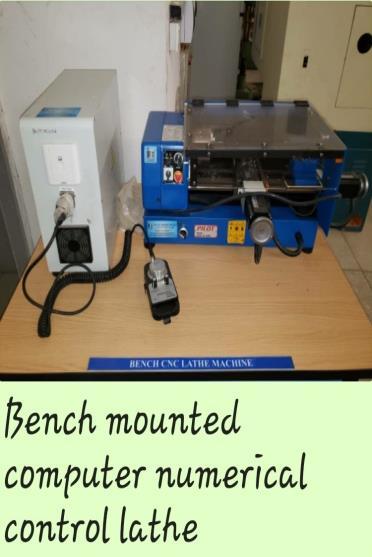

Mechanical Engineering:
Mechanical Engineering is one of the broadest and oldest branches of Engineering. It plays a critical role in manufactured technologies in almost all fields of Engineering such as Agricultural Machineries and Tools, Construction, Marine, Metallurgical, Mining, Chemical, Automotive, Aerospace Industries. It enables us to execute daily activities with ease, as it deploys helpful technologies to solve problems. At Baze University, Mechanical Engineering Students get a unique experience at handling modern equipment and tools to address pressing needs of the human society with emphasis on the field of energy generation, distribution, transportation, manufacturing and health care delivery. We offer students a broad-based Degree with a sound foundation in Engineering Science focused on quantitative, problem solving, mechanical design and an opportunity to develop communication skills; these are needed in future in the pursuit of their career goals. The Bachelor of Engineering (B.Eng.) programme is designed to produce a total graduate empowered with the right standards to practice Mechanical Engineering in the field, the industry and manufacturing sectors. The programme consists of lectures, lab practical, projects and training in the industry. The Department has five laboratory/workshop: Applied Mechanics Lab; Strength of Materials Lab; Fluid Mechanics Lab; Thermodynamics Lab, and Mechanical Engineering Workshop.

Visitors inspecting the Fluid Mechanics Lab with several Turbines, Oil Hydraulics Trainer, Hydraulic Bench, etc.
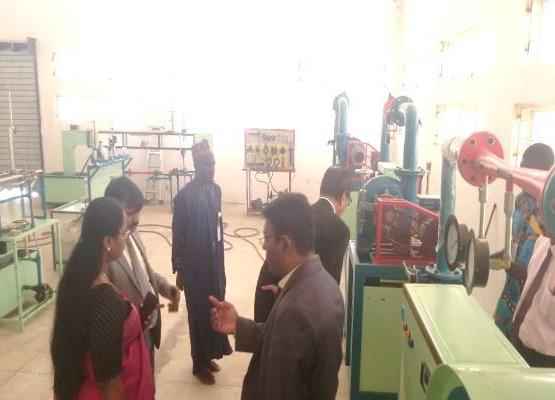

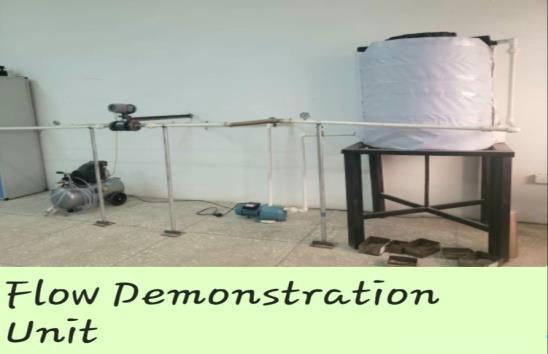
Petroleum and Gas Engineering:
Petroleum and Gas Engineering (P&GE) is a field of engineering concerned with activities related to the development (exploration, extraction, and production) of hydrocarbon reserves, which can be crude oil or natural gas. P&GE has remained important to every segment (economy, politics, and technology) of society since ancient times. From history, P&GE developed due to the advent of the internal combustion engine, the rise in commercial aviation, and the use of petroleum in industrial organic chemistry (synthesis of plastics, fertilizers, solvents, adhesives, and pesticides). At Baze University, P&GE study allows students access to robust facilities in four Laboratories of Drilling, Reservoir, Production Engineering and PVT, respectively. The Bachelor of Engineering (B.Eng.) programme is designed to meet the needs of the petroleum and natural gas industry and it consists of lectures, lab work, computer simulation, projects, and practical training. The Faculty also has a mentorship scheme to ensure that students are properly guided and tutored. The members of staff are highly qualified, very friendly, and always willing to assist students with their academic work. The students spend a year on industrial attachment to get hands-on experience and improve their career and job prospects. Major key players in the industry (NNPC, TOTAL, Greenville Energy, Green Energy, Halliburton, NLNG, DPR, etc) are usually willing to accept our students for industrial attachment because of the value they add.
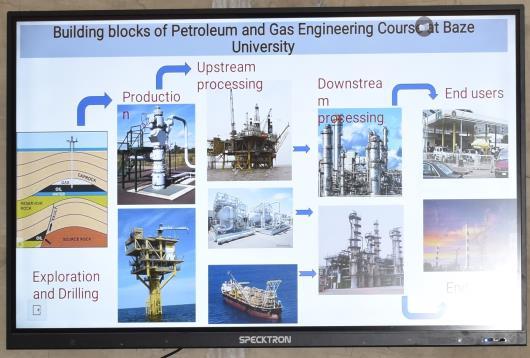


Telecommunications Engineering:
Telecommunications Engineering is a wide field of specialization that offers jobs such as Telecom Researcher; Designer (Hardware, Electronic, Network); Manager (Field, Product or Network); Engineer (Radio Frequency or Computer Software), etc. Telecom Engineers design, implement and manage systems for processing and transmitting information, and there are career opportunities with Telecom providers: (e.g Telstra, Optus Unwired, Vodafone, AAPT); Vendors (e.g Motorola, NCC, MTN, Etisalat, Globacom, Airtel, NIGCOMSAT); Computer companies (Microsoft, IBM, Google); Telecom Regulators; Universities; Multimedia, Computer & Mobile communications Companies; TV & Radio broadcasting, Remote sensing, and Next-generation networks. At Baze University, the B.Eng. Telecommunication Programme offers high-quality education with a curriculum firmly grounded in telecommunication engineering fundamentals. The programme consists of lectures, laboratories, projects, and practical training. There is a mentorship scheme to ensure that students are properly guided and tutored and staff are always willing to go the extra mile.
The Telecommunications Laboratory with State-of-the-art Antenna Trainer
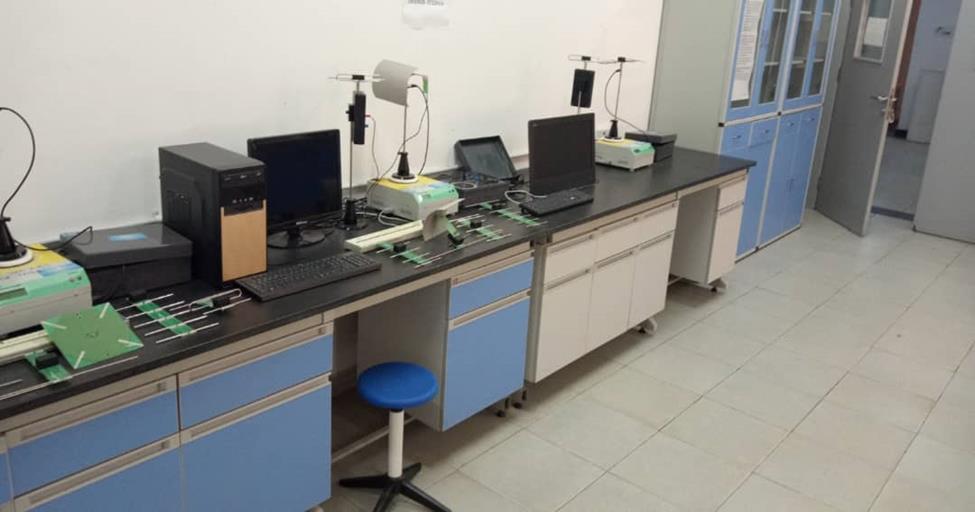


Telecommunication Laboratory Showing TDM Pulse Amplitude Modulation trainer, ASK Modulation/Demodulation Trainer, Fibre Optics Trainer, DSB/SSB Receiver Trainer


Excellence in Delivery
The core philosophy at Baze is founded on the belief that great teachers need great tools, to deliver unique but impactful learning experiences. The University has transformed Pedagogy from the use of traditional tools to more computerized, dynamic, and interactive ones. In all Faculties, the best teaching tools are deployed by staff to ensure effective delivery and these include Operating System enabled Smartboards, Projectors and Simulators all connected online through a central LAN -Network.
The delivery methods go beyond physical classroom contacts, as lecturers maximize other remote educational tools including Google classroom, Turnitin, etc to ensure that student stay connected for continuous training and interaction. During the CORONAVIRUS Lockdown, there was no panic as we all simply transitioned into the full online mode. In line with the University’s policy, staff are mandated to utilize these tools and are constantly trained on newer tools and systems to keep them up to date. The system is supported by a feedback portal activated at the end of every semester to determine the impact of the teacher, tools and methods on students, and staff have to provide evidence of complete compliance during the Annual Staff Appraisal Review Exercise.
A typical Classroom with Public Address System, Projector, Smartboard and White Board.
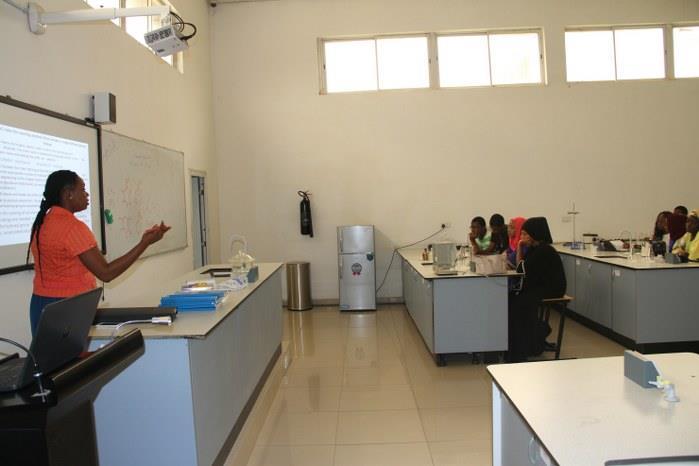
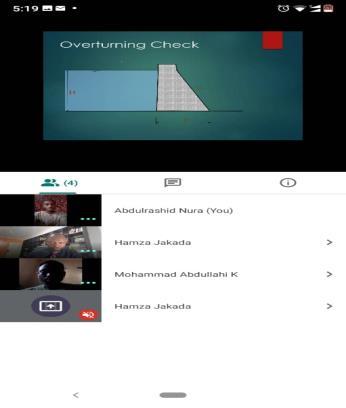
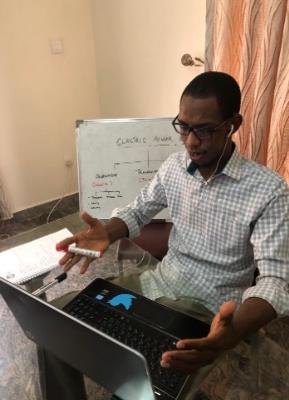
Teaching Never Stops: Engineering Lecturers delivering Classes Online during the COVID-19 pandemic Lockdown

Training Engineers for tomorrow’s industry in Nigeria
The training of Engineers in Nigeria is broadly governed by legal frameworks provided by two institutions – the Nigerian Universities Commission (NUC) and the Council for the Regulation of Engineering in Nigeria. NUC provides Approvals to deserving universities to offer training programs in Engineering to qualified students while COREN is specifically for the regulation of the training and practice of engineering in Nigeria to ensure that quality and standards are preserved. NUC and COREN have issued, independently, the quality control document known as Benchmark Minimum Academic Standards (BMAS) prescribing minimum curriculum content for training in various fields of engineering in Nigerian universities. BMAS is periodically reviewed to ensure that training remains relevant to national needs and realities. In the Faculty of Engineering at Baze University, our programmes go beyond the BMAS as students are given wide ranging experiences to set them apart from others. The Faculty explores deliberate cooperation and collaboration with the industry, private sector and professional bodies so that students gain practical experiences from available facilities and the feedback provides the pathway for further curriculum development and review.
As a policy within the Faculty, every final year student is required to work on a project that solves a particular engineering problem bedeviling the society. For example, a final year student came up with a cheaper, faster, and more hygienic solution to how rural communities can conserve energy while cooking; this invention can be shared and replicated anywhere in Africa. The Faculty is also collaborating with international engineering organizations that offer solutions into unique problems within the African continent. This allows our students to be exposed to best practice solutions to immediate societal problems during their programmes to improve their employability after graduation. The Faculty has established a Research Center called Baze University Water and Environment Research Center (BUWERC) located in the Department of Civil Engineering. So far, the center has extracted commitment and working relationship with several lead companies in Nigeria and International Development Partners including the Japan International Cooperation Agency (JICA).
Faculty of Engineering hosting the first IEEE African Student and Young Professional Congress (ASYPC) Baze University Engineering Student on Industrial Training with Julius Berger Plc.
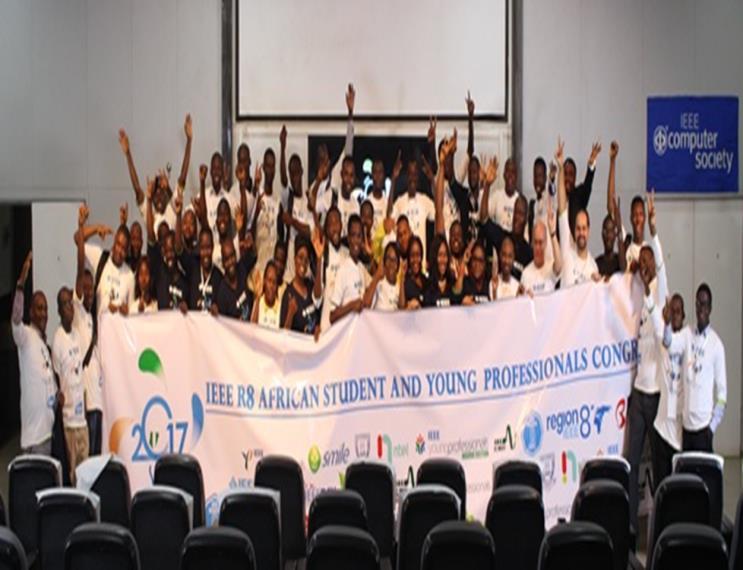
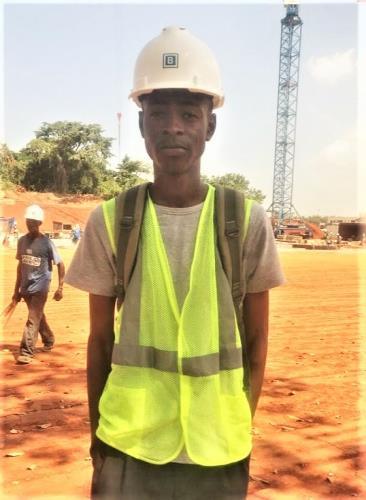
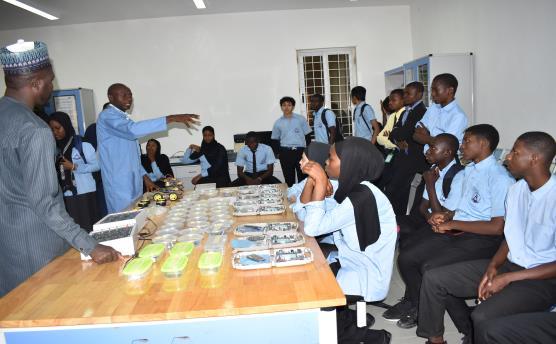
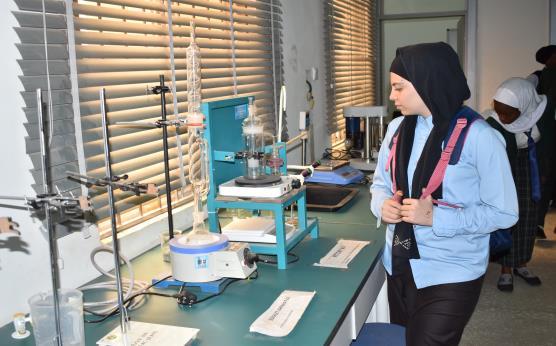

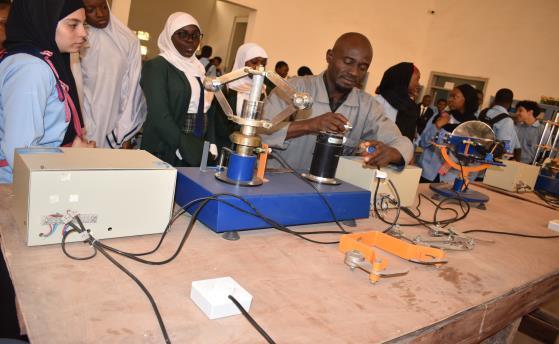
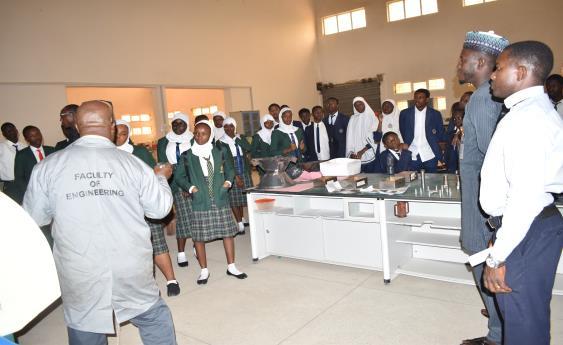
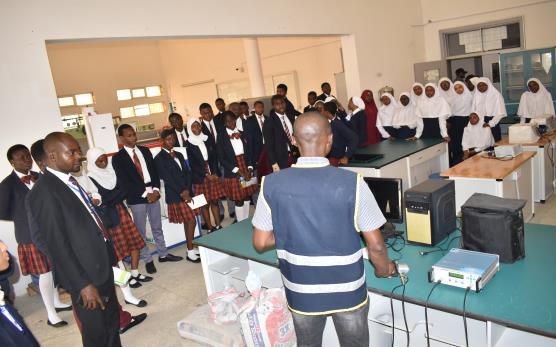


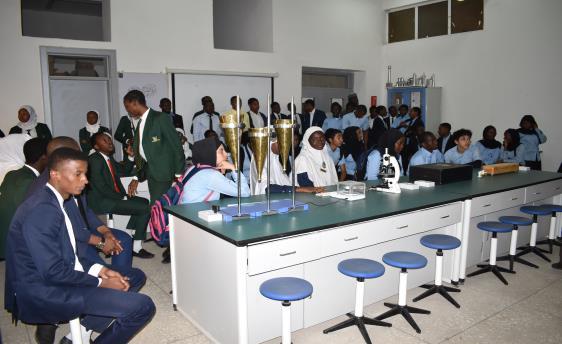
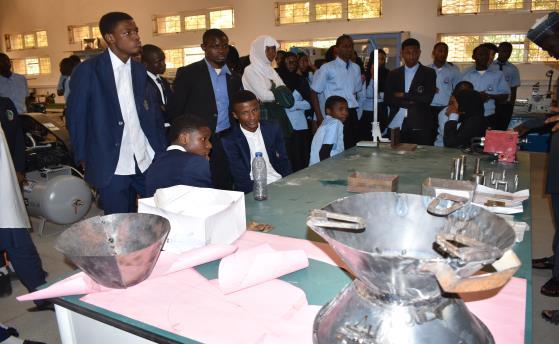

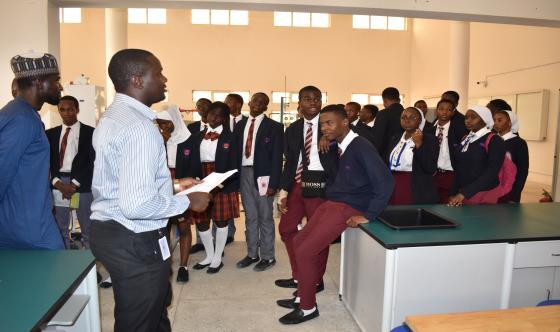
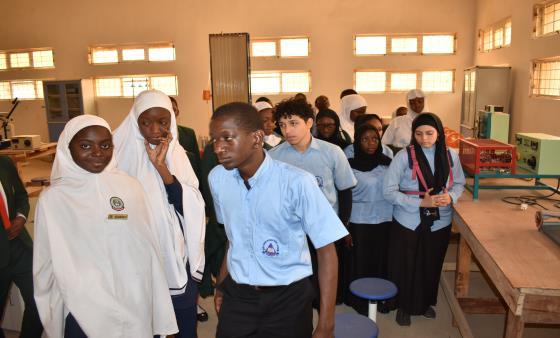
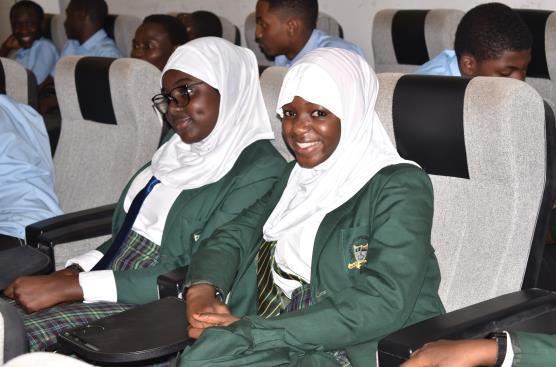
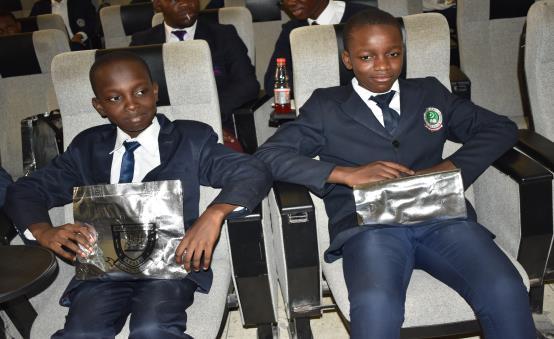

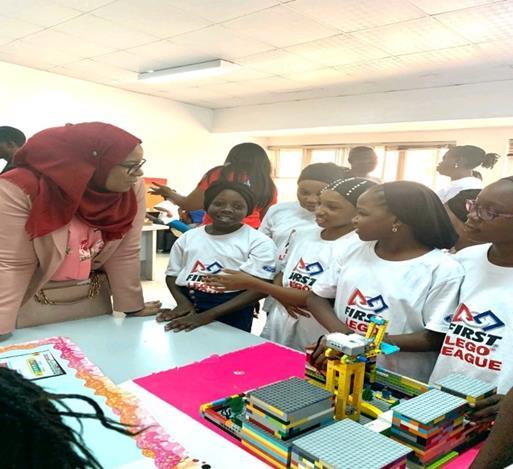
Faculty of Engineering: Robotics Program for Young Girls with Engr. Hajara Kabeer.
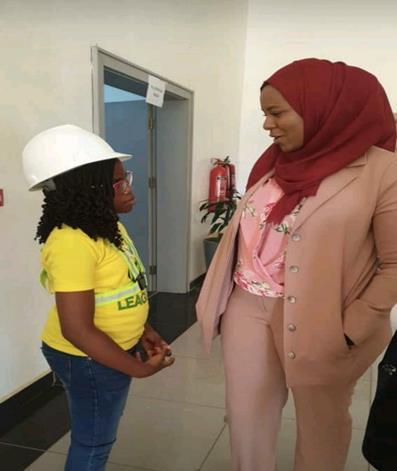
Promoting Gender Inclusivity in Engineering
Female participation in Engineering is steadily increasing in Nigeria, three decades ago, the Association of Professional Women Engineers (APWEN) had only 6 members, today the number has risen to 3,000. Today, one of the country’s most successful Tech & IT Service Provider - Outsource Global Technologies Ltd - is owned and operated by a woman. Other promising enterprises such as CoAmana, are changing the narrative of female participation; but progress is at an excruciatingly slow pace. There is still much work to be done to sustain gender inclusivity. There is need to locate passion at the grassroots and strive for success at individual and community levels. To attract more females, the Faculty of Engineering recently organized an Open-day event for secondary school students who were invited to a Facility Tour to get an in-depth view on the various programmes offered. The special focus was on female students and we are happy about their interest to pursue Engineering as soon as they graduate. The Faculty has a special mentorship programme for its female students, and this has tremendously reduced attrition rates. The Faculty will continue to drive this vision of growth, equality and progress.
A Vision for the Future
The future for the Faculty is bright. The milestones in the past five years is a testimony: recruitment of quality staff, procurement of high-end equipment, attainment of full accreditation status for all Engineering Programmes, etc; the possibilities for future growth are endless. The vision is to become the number one Engineering powerhouse institution of innovation on the African continent. The strategy is to constantly improve course delivery, curriculum, teaching methods, internship periods, employment prospects, etc. To this end, the Faculty will strengthen its performance metrics and track its feedback loop in line with international best practice standards.
*Dr. Nuradeen Labaran TANKO is an Associate Professor and Dean of the Faculty of Engineering
Kathleen OKAFOR*
The Faculty of Law in Baze University runs a student-centred learning programme where students learn hands-on. In the past year, and especially during the months of the COVID - 19 Pandemic Lockdown, students were engaged in several innovative activities. Some of these activities that took place in the year are presented below:
Baze University Law Clinic.
The Law Clinic has Units which include Pre-Trial Detainee Law Clinic, International Humanitarian Law Clinic and the Migration and Trafficked Persons Law Clinic. This diversity is to create robust avenues for students to participate in clinic activities based on their personal areas of interest.
Pre-trial Detainee Law Clinic
In 2018 students of the Pre-Trial Detainee law clinic (clinicians) were engaged in a project called the 24-month Reforming Pre-trial Detention in Kuje Prison Project (Reform Kuje). This project is funded by the United States Department for International Narcotics and Law Enforcement (INLC) and other partners include Partners Global, West Africa Nigeria and Network of University Legal Institutions (NULAI). There was an exchange visit to the United States in 2019 under Prof. Ernest Ojukwu, the Chairman of Baze University Law Clinic Committee. During the exchange visit students learnt about the United States Legal System and how the Law clinics in Maryland and Georgetown Universities operate. Under this project, the students have participated in Trainings, interviewed over 60 Pre-Trial Detainees in Kuje Correctional Facility, helped Detainees trace and inform family members of their whereabouts, observed Court Proceedings on Cases they handle and draft Court Proceedings under the supervision of pro bono Lawyers and the Law Clinic Supervisors. Due to the success of the 1st phase of the project, the students of the Pre-Trial Detainee Law Clinic were invited to participate in the 2nd phase which kicked off in 2020 and is known as Reforming Pre-trial Detention in Nigeria (RPDN) Project. Under the new project, students have been engaged in online trainings, which involves pre- class, in-class, and post class activities.

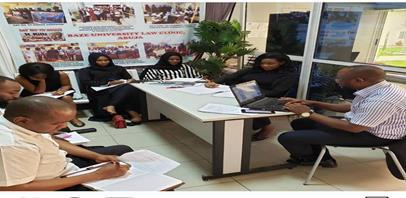
Left: Dayo Ashonibare Secretary, Law Clinic & students participating in the training for the Kuje Prison Project organised by NULAI. Right: Students & Clinic supervisor engaged in Case Review & Management
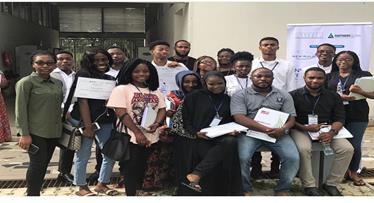
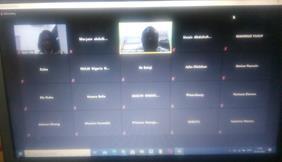
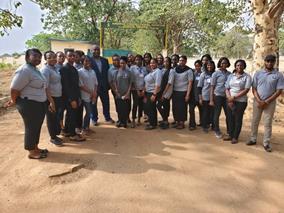
Left: Students of the Kuje Prison Project and a lawyer during case observation at the Federal High Court Abuja. Middle: February 2020 - Law Clinic supervisors (Remi Famodile, Tosin Oke and Maryam Idris Abdulkadir) and students visited the Kuje Custodial Centre, Abuja (students conducted interviews on pre-trial detainees)
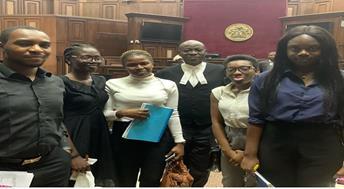
International Humanitarian Law (IHL) Clinic
Since inception, the students in this Clinic have participated in Moot Court Competitions which have exposed them to International Law practice, they have visited Internally Displaced Persons Camps to interview victims of armed conflict and have provided humanitarian assistance. In July 2020 the IHL Clinic organized a webinar for students with the aim of disseminating the knowledge on IHL activities.
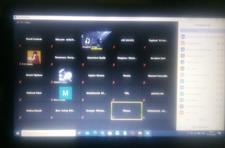
IHL Webinar organized by students of IHL Clinic of Baze University
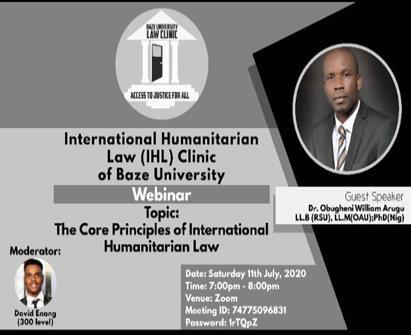
3. Migration and Trafficked persons Law Clinic
In February 2020, the Association for Juridical Studies on Immigration (ASGI) organized a Conference in Lagos and invited Baze University Law Clinic. In 2019, ASGI designed a project called- the Oruka project to counter national, European and international policies that have been put in place to limit freedom of movement of non-European citizens and their right to asylum. This project also seeks to address Human Rights violation for Asylum seekers and trafficked persons, lack of sufficient data on returnees to Nigeria and lack access to justice for victims of these violations. In line with the Motto of the Clinic; Access to Justice for ALL and the issues that migrants and trafficked persons face that smacks social injustice and lack of access to justice, the Baze University Law Clinic established the Migration and Trafficked Persons Law Clinic. ASGI is happy about this development and have requested a synergy with the clinic in the following areas: Training and workshop about situation in Italy/Europe, Mutual exchange of practices about cases, Simulation of strategic litigations in view of future strategic litigations, and Collaborative Desk and Internship in the ORUKA project for students. The Migration and Trafficked persons Law Clinic in the University of Turin, Italy also took interest in the Baze University M&TP Law Clinic. In July 2020, the clinic in Italy invited the M& TP Law Clinic students of Baze University to an online meeting to discuss future collaborations.
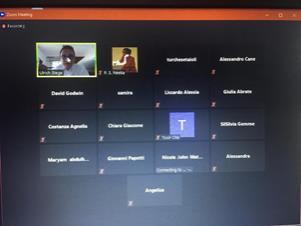
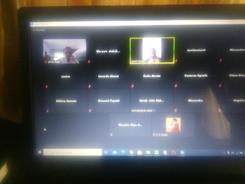
Clockwise: 1st -3rd Pictures - Zoom Meetings between Students of University of Turin and Baze University M&TP Law Clinics.
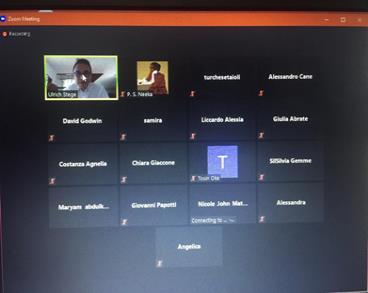
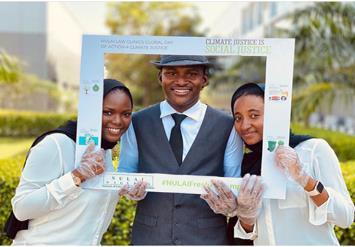
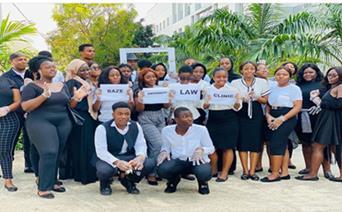
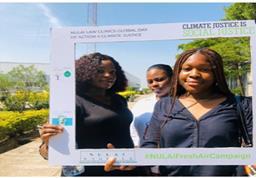
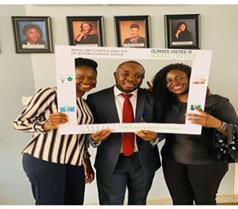
Students’ Network
The Faculty of Law encourages students’ Field Trips to notable Law Firms, and Government Agencies to obtain first-hand experience on how such offices operate. Students are supported to compete with other universities in programmes like the NULAI Client Interview and Counselling Competition. Students are also guided to engage in Campaigns to commemorate notable International Dates like the International Day for Women, World Earth Day and the NULAI Climate Justice Campaign e.t.c.
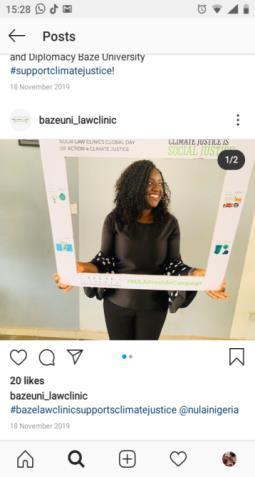
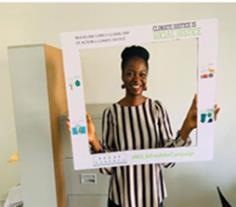



Clockwise:
1st Pic: Prof. Ernest Ojukwu, Chair Baze Univ. Law Clinic, in NULAI Fresh Air Campaign (Climate Justice). 2nd Pic: Coordinator Baze Law Clinic at the Justice for Climate Campaign. 3rd Pic: Ms. Remi Famodile, Supervisor Law Clinic at the NULAI Fresh Air Campaign ( Climate Justice). 4th Pic: Dayo Ashonibare (Sec. Law Clinic), Tosin Oke & Remi Famodile at the NULAI Fresh Air Campaign. 5th -7th Pic: Students of the Faculty of Law in the NULAI Fresh Air Campaign (Climate Justice) 8th Pic: Dayo Ashonibare (Sec. Law Clinic) at the 2020 International Women’s Day. 9th & 10th Pics: Students of the Faculty at the International Women's Day, 2020 11th Pic: Visit by Students to EFCC Office Headquarters in Abuja.
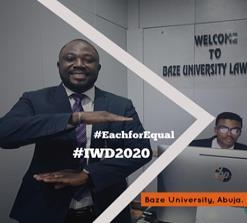
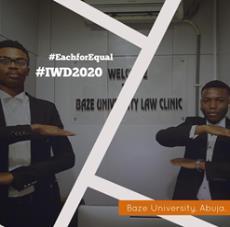
*Prof. Kathleen OKAFOR, FCIArb, is the Dean of the Faculty of Law
Innovative Solutions to Online Teaching in Environmental Sciences Amina Lawal BATAGARAWA*
The new normal
The Covid-19 pandemic has caused a huge setback for the world. As part of the World Health Organization’s (WHO) Guidelines for managing the virus; most countries have had to impose a lockdown as a preventive measure to curb the spread of the virus and also an indirect way to reduce the pressure on the Health care Systems. The lockdown resulted in the closure of businesses, factories, industries, offices, schools, hotels, and other public and private organisations. Nigeria was not been spared of this biological calamity as the whole country grinded to a halt with the total closure which seriously affected all educational institutions including Universities. A direct implication of the closure of educational institutions is that many who had IT infrastructure quickly moved from the face to face teaching and learning to the online system. Baze University transited to remote learning in the early days of the lockdown. This transition was remarkably more challenging to practical based Faculties like the Environmental Sciences which offers Bachelor of Science (B.Sc.) Degree in Architecture, Building, Estate Management, Quantity Surveying, Surveying & Geo-informatics and Urban and Regional Planning.

Challenges of Online Learning
As a normal routine before the lockdown, teaching methods in all the six Departments relied heavily on practical demonstrations and laboratory work that give students robust experiences to produce true professionals in the field. Thus, students and staff faced several challenges with regards to teaching and learning online. These challenges were in relation to the Learners, the Content, and the Instructors. The issues related to Learners include learners’ expectations, readiness, identity, and participation in online learning. For the Content, the issues were in relation to content development, integration of multi-media in content, instructional strategies in content development, and considerations for content development. The issues related to instructors may be summarised into the four specific categories: changing faculty roles, transition from faceto-face to online, faculty time management, and teaching styles. Other challenges were unavoidable technical and technological issues, especially for a developing country like Nigeria. There are several tools available to aid online teaching and learning. Baze University has a robust digital technological system in place that services all the classrooms using the Google Suite, including the GMAIL. For those already conversant with the services, the transition was easier than for those who remained ‘analog' in teaching methods. The latter are in the minority, and the University laid down pre-requisites to facilitate the process: possession of gadgets like Laptops and Tablets and the ability to use them adequately, preparation of lecture notes and assessments on e-formats, free data bundles for staff and students, surety for staff to procure gadgets through ICT loan, etc. So, whereas the idea of shifting learning experience to Online platform was overwhelming for all, adjustment to the new system was quick. Generally, connectivity became the biggest issue faced by all students and staff, many in different locations not properly serviced by service providers. A good internet connection is based on location, good weather, strength of network service, e.t.c. and when one or more factor is affected, access to the internet becomes compromised. However, staff and students have come up with innovative ways to deal with this challenge. On connectivity issues, students and staff identify the best network that works for them at different locations. Some have acquired new Subscriber Identification Module (SIM) cards with multi-location network conditions to enable switching while being mobile. The persons with gadgets that rely on electricity have made room for power-storing devices like Portable Power Banks, Rechargeable Power Blocks, Uninterruptible Power Supply (UPS) Units, e.t.c. 46
The second most prominent challenge was working or receiving lectures from the home environment, whereas the work environment is designed to promote efficiency, the home environment is cosy and restful. The unification of these two spaces have always proven conflicting to people and at time with adverse effect with a possibility of an Online session being interrupted or disrupted by home activities. Students and staff respond to this by setting up a smaller environment within the home.
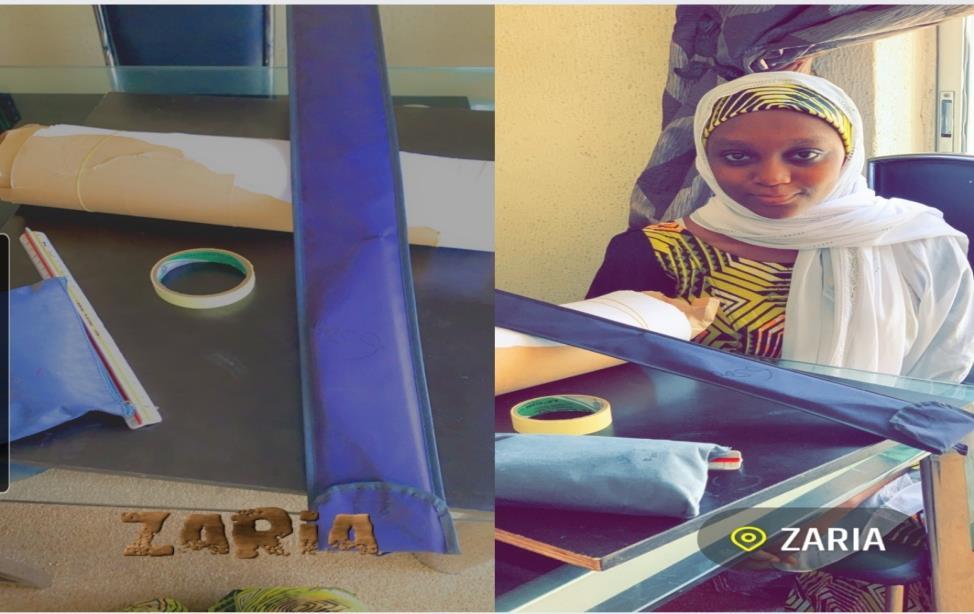
Fig. 1: Fatima Baba (400 Level student) using manual drafting equipment in her home studio.
Another challenge was time management; use of the Online Assessment Format and the intervals between assessments became intriguing. For persons taking or offering 7 to 13 courses per trimester, there is a compulsory turn-in of course assignments on a weekly or bi-weekly basis. This process becomes even more frantic during the examination period because of the gravity of work. To curb the problem of time management, students and staff organized Online classes and sessions through the Google Classroom. This platform contains tools that ease the process of issuing lecture notes and tests and collecting submissions. For instance, explaining and working on mathematical formulae and algorithm is difficult for students to follow through. Our staff solved this issue by presenting formulae and algorithms boldly to the students Online, explaining them slowly and gradually and solving questions together to confirm their answers before giving homework after each lecture. A trick is to call students by their names to ensure attentiveness and participation, award marks for Class Attendance, adopt the Rule of no attendance - no acceptance of homework/ assignment, informal communication of schedules, repeat disrupted lectures that was due to internet failures, make personal phone calls to students before commencement of lectures to reduce absenteeism, send reminders to students to get their practical items ready, record lectures so students can catch up with classes in the event of extenuating circumstances, etc. Online delivery of practical courses means the hands-on experience is absent. To minimise the effect, the process of design and developing a portfolio is promoted with the use of mixed methods of teaching and assessment. These include videos, animations, Computer Aided Design software, and electronic portfolio services such as Google Slides, group projects, prototype and modelling, competitions and community development projects as shown in the pictures presented below.

Fig. 2: Interactive sessions with student showing ability to collect data, analyse challenges and proffer solutions

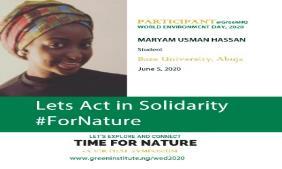
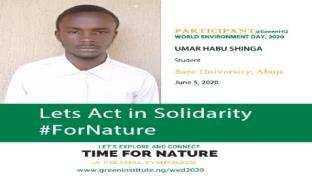
Figure 3: Feedback from staff based on students submissions



Fig. 4: Environmental Day E-Participants

In view of the ingenious ways that proved effective using remote learning during the Covid -19 Pandemic Lockdown, education of the future may never be the same again. Educational institutions may eventually rely on Online platforms as back-ups to avoid major setbacks in case of emergencies, or permanently integrate the online delivery into the education system for a blended approach. The Faculty of Environmental Sciences is confident that whatever challenges come up in the future, we will develop coping strategies to produce world class professionals in line with the quality associated with Baze University and as shown by some students’ works below.


Fig. 5: Computer Aided Drafting for Students in the Department of Architecture
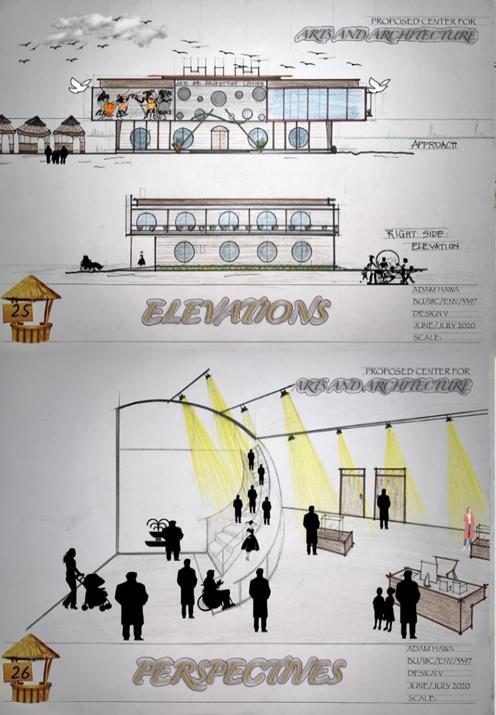
*Dr. Amina Lawal BATAGARAWA is a Senior Lecturer in the Department of Architecture at the Faculty of Environmental Sciences.
Mobile Technology: Good Servant, Terrible Master .
James DANIEL*
Preamble
There are about 7.7 billion people in the world today. It is projected that 3.5 billion use smartphones worldwide and this translates to 45.4% smartphone penetration rate (O’dea,2020). This means four out of ten persons in the world have smartphones. According to Global Mobile Workforce Forecast Update 2016-2022, Mobile Technology has taken over the lives of human beings, and it is ruling the world via Social Media with global mobile workforce estimated to reach 1.87 billion by 2022.

What is Mobile Technology and Social Media?
The question to ask is what is this Mobile Technology and the Social Media? Mobile Technology is a portable two-way communication computing device with an installed networking technology. Mobile technology is typified by Internet-enabled devices like Smartphones, Tablets, and Watches. It has surreptitiously taken over the world and may be said to rule the lives of 60% of youths in the world (under 40 years of age). It is a technology that follows the owner to wherever he goes. The Social Media on the other hand has an interactive computer mediated technology designed to facilitate the creation and sharing of information, ideas, career interests, and other forms of expressions through virtual communities and networks.
Is Mobile Technology Detrimental to the Society?
It is not unusual these days to walk into a public facility filled with young people and not be noticed by anyone because they are glued to one form of mobile technology or the other. It is, as if, nobody really cares! More so, that the individual that walked into this space did not notice anyone because his eyes and ears are captives of some form of technology. Conjecturally, perhaps the person he almost tripped over, was also typing away on the phone. In this scenario, one would expect someone would break the ice with an exchange of words like, “I’m sorry”, “I’m good, are you okay?”, or “Hey! Watch where you’re going.” But no, not one word of remorse! I am sure many people can relate to these backdrops.
Technology which was meant to make life easier appears to have numbed our sensitivity to people and the world around us? Has relegated our relationship quotient to the lowest ebb, thereby creating millions of mobile technology maximum prison cells? As enticing and fun as mobile technology appears to be, it is detrimental to our form and development of society because of the many negative ways it impacts relationships, health and creativity and our psychic. According to Sherry Turkle, (2015), “When we become too dependent on our mobile phones, we lose our ability to have deeper, and more spontaneous conversations with others, changing the nature of our social interactions in alarming ways. Once, you introduce a cell phone into a social interaction, it does two things: first, it degrades the quality of what you are talking about, because you want to talk about things where you wouldn't mind being interrupted, which makes sense, and, secondly, it decreases the empathic connection that people feel toward each other.” The use of mobile devices is at the bottom of many conflicts and the collapse of relationships of all types and shades – family, friendship, romance, acquaintance, formal, emotions, etc., In 2017, Kings University Texas, USA provided some statistics; People tap, swipe, text, and click their smartphones an average of 2,617 times per day. For the top 10% users, this number doubled to 5,427 touches per day. That is about 1 million touches per year and 2.42 hours of phone screen time per day.
More serious users interacted with their phones even more, at 3.75 hours per day. This data includes all types of interactions, from reading and sending texts to scrolling on social media. iPhone users unlock their phones an average of 80 times per day, while according to Business Insider, Android users unlock their phones 110 times per day. This means that, in an average day of usage, iPhone users check their phones six to seven times per hour, or once every 10 minutes. Frequent smartphone usage within conversations can have a negative effect on communication and relationship with others during social engagements, and this is often seen as intrusive and disruptive. In some cases, it might be said that we have fallen more in love with digital interaction than with face to face social interactions. Dependence on technology for work, play, learning, communication, navigation, looking up meanings of words and shelving away boredom has acutely punctured holes into interpersonal relationships. When mobile devices are present, eye contacts, handshakes, hugs, intimacy, and conversations shrink to mono-syllabic, reluctant, emotionless groans and interrupted whispers. The real world seems to fade in comparison with long hours of chats and hundreds of messages, but those long hours can never substitute the human need for touch and real-life community.
Rich Social Relationships
Nothing exasperates a partner than pulling out a smartphone on a dinner date and attachment to your phone sabotages relationship with a loved one. Many people tend to develop a fastpsychological relationship with the smartphone and this triggers emotional competitive jealousy in human relationship. Surely, even without much analyses and statistics from huge studies, one can fathom that mobile technology is detrimental to relationships; let’s bring it home. What hap pened the last time you went to the park or to lunch with your friends? It was meant to be a time to hang out with each other but let me guess what happened, each of you probably ended up hanging out with your cell phones, texting, playing games, touching, scrolling, and clicking like a hundred times within the one hour of socializing. The tradition of talking about how our day went and other sweet nothings we talk about over dinner that glue the family together has been bullied away by the presence of smartphones on the dining tables. If you have kids, you may be able to relate to this true-life scenario: I always love it, whenever I get home and my little kids run to me – hugs, kisses, someone singing and searching my pockets for candy or any goodies at all. That makes my day. But what happens if they have a mobile device in their hands or in front of them? Your guess is as good as mine or you might be speaking from experi ence. No hugs, no salutations, at best, you may get a cold distant “welcome Daddy” and that is a delight killer right there. Times when I’ve followed my jealousy, (let’s just call it love for now) and dared to take away the mobile device, the reaction ranges from emotional outbursts of tears to some form of mini civil or cold war in some cases, which naturally ruin our time togeth er temporarily because everyone gets upset. Entire relationships are becoming defined through mobile texting and colourful little emotions, from saying "I love you" to "I think we should move on." So, we talk less and text more, whereas, satisfying the social need of human beings cannot even be scratched by sending and responding to codes like machines and robots. The lack of satisfaction leads to frustration which produces negative emotions deeply locked within or exhib ited as transferred aggression towards unintended people.
Healthy living
While it is vital to pay some attention to relationships being dulled by the influence of mobile technology and too much time spent on the screen, we should equally pay attention to the influence of mobile technology on our health. Mobile technology has enormous negative potential impact on our physical and psychological wellbeing. The ubiquitous use of smartphones in modern society has created a new psychological malady known as nomophobia, the anxiety or fear experienced when one is unable to access technology.
Healthy living
A nomophobe is incredibly stressed and uncomfortable in the loss of a smartphone or inability to get online; a symptom which alludes addiction to technology. Small text and bright screens can strain mobile phone users’ eyes. Since tablet computers, smartphones, and other hand-held devices are designed for reading at close range, users’ eyes must constantly refocus and reposition to process the graphics and text on screen. As digital use increases, so do potential vision problems, including eye strain. eye redness or irritation, dry eyes, blurred vision, back pain, neck pain, and headaches. It is claimed that looking down your smartphone, with chin to your chest, puts about 27 kilograms of force on the neck. Of course, Smartphones and other mobile devices give us faster access and perform actions faster but overdependence on them has drastically reduced the necessity to engage our brains actively, deeply and relatively. Most people don’t bother to recharge their brains for even the simplest mental activities such as basic mathematical calculations as long as they have a mobile device with them. Using their brain or putting pen to paper becomes the anomaly, making smartphones a brain drain. Many creators will agree that creative ideas come easily during relaxed, leisure moments, when the mind is unfocused and available to the gifts of the unconsciousness. With the way mobile devices are used these days – constantly checking emails and social media, scrolling, sharing, liking or disliking, clicking etc., that relaxed, leisure, unfocused moments that open the door wide to creativity and innovations may be eluding the society fast.
A Challenge to Intellectual Capacities
As a parent, I have noticed that kids use their toys and what they find in their environment creatively when no technology devices are present or active. My 3-year old grandchild in particular will give names to his toys, tell stories, make up dialogues between cars, super-heroes and Paw Patrol characters; you can watch him entertain himself for hours and not be bored. You can also be sure to have a happy camper for the rest of the day. Compare that with a day he manages to sneak a tablet or phone off you, you better be ready for a fight when you want to retrieve that device. Studies have attributed behaviours like aggressiveness, poor judgment, and lack of self-control to people hooked to mobile devices and the Internet. Individuals with Internet addiction have been found to have less grey matter in several important areas of the brain, including the frontal lobes, the striatum, and the insula. These conclusions published in Frontiers in Human Neuroscience describe what we do to ourselves when we plant ourselves in front of screens (smartphones, tablets, computers, or TVs). Such devices deliver instant gratification that hardly exist in the real world, heightening the preference for virtual reality. With the sleek Google lady’s voice directing you left and right on your journey, map reading that gives children the spatial sense of their environment is been thrown to the dogs. Spatial reasoning is a critical skill for students. Glued to virtual reality, students are losing the ability to visualize and create in the real world. They are also getting lazy. Unlike reading a book, which prompts children to flex their cognitive muscles, watching TV or using a tablet spoon-feeds ideas and images to them. The device does the thinking; while the student only passively absorbs with little substantive involvement.
Making True Friends
With mobile technology, particularly the social media, making friends is much faster than by face to face interactions. However, how many of these social media friends are truly friends? When you have to get to the emergency ward and there are no family members nearby, can you call on your Facebook friend who lives abroad to take you there? There is usually no commitment to or from friends made on social media platforms.
Communities on social media platforms are great but they cannot satisfy the human need for conversations, or replace empathy and intimacy in face to face conversations – eye contact, tones and melodies of another person’s voice, body movements, gestures, overtures and the presence we sense, cherish, enjoy and feel. No doubt, portable communication technology provides convenient and efficient ways of keeping in touch with family members and friends. In many cases, the availability of smartphones has saved lives and averted potential harms due to speed of communication. However, we need to bear in mind that what necessitated the keeping in touch or tracking in the first place is the face to face relationship that had been established.
Why not, if not?
Portable communication technology is not bad and nobody can brush aside positive effects of the social media on current affairs, governance, medicine, politics, etc. What is detrimental is the over-use and over-dependence, and of course, the negative usage culminating in fake news and misinformation. A future without technology is bleak but living in greater harmony with it for present is best. Mankind must not allow communication devices to be the master, rather it must be a service to be maximized according to cherished cultural values. Therefore, in those human moments, accept that life is not a steady “feed,” and learn to savour the pace of conversation—for empathy, for community, for creativity and for initiative. Just like money, mobile technology can be an exceptionally good servant, but a very terrible master, don’t let it control you; I think you should control it. Why not, if not?
*Dr. James O. DANIEL, FNLA, FCAI is the University Librarian


The Baze University Teaching Hospital (BUTH) is a 150 Bed facility project currently under construction and expected to be fully commissioned by the first quarter of 2020. It will be a Center of Excellence for Medical Services and Training. The Hospital will have 26 Service Departments (ER/ICU, Oncology, Neurology, Medicine & Surgery, Obstetrics & Gynecology), modern facilities and state of the art equipment. Patient wards will range from 6 room occupancy, double rooms, single rooms as well as VIP suites to cater for all needs. The teaching and learning facilities will be of international standard and meet all requirements by the Nigerian Medical and Dental Council as well as the National Universities Commission (NUC). The photos below were taken before 25/11/20, there have been further developments on site at the time of publishing this magazine.
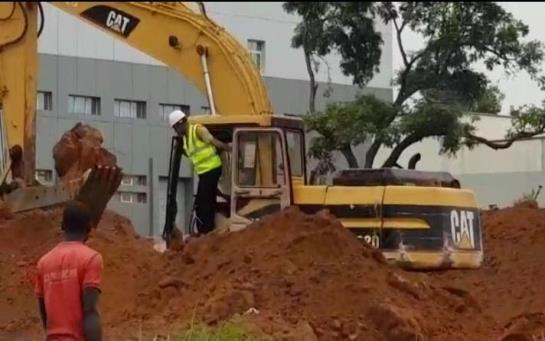

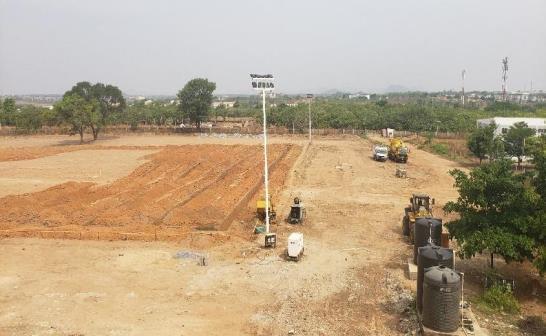
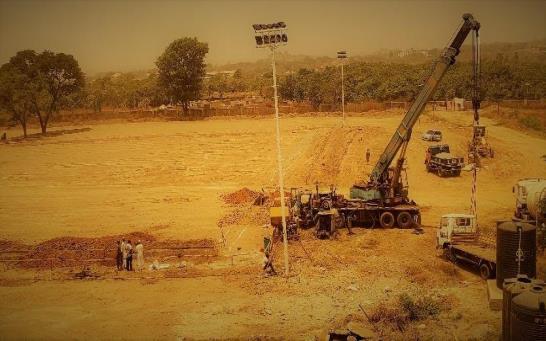
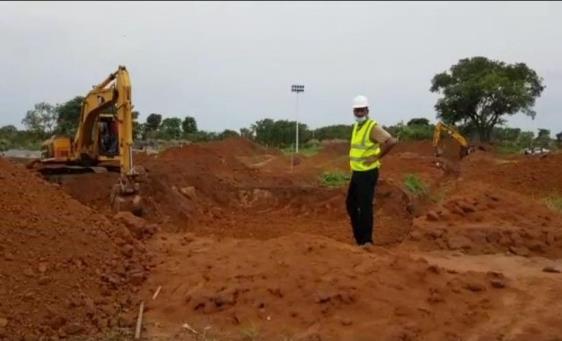
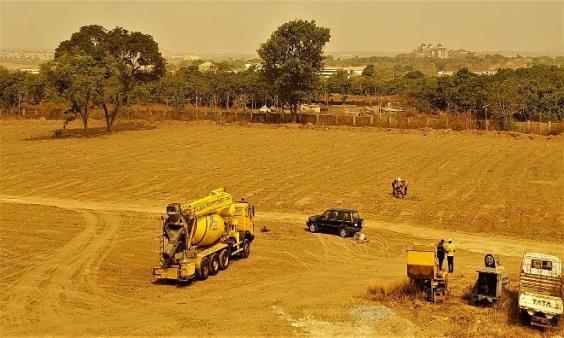
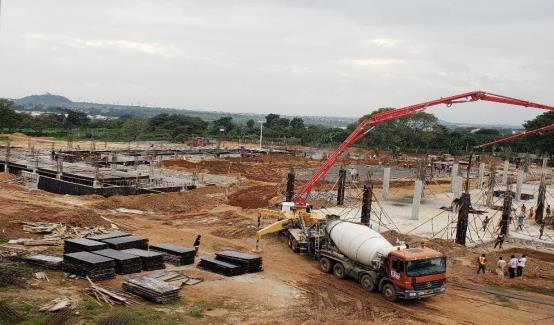




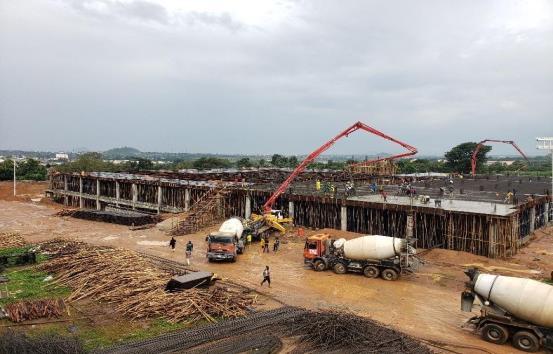
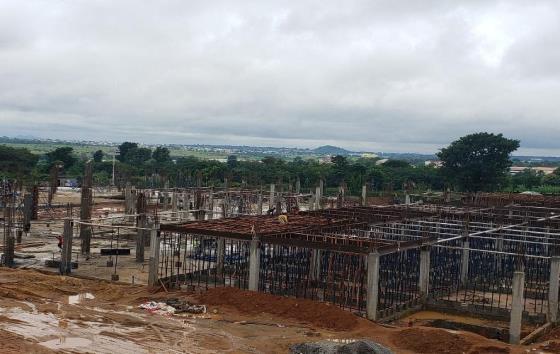
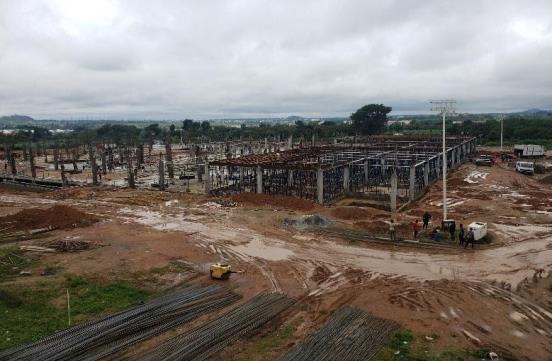
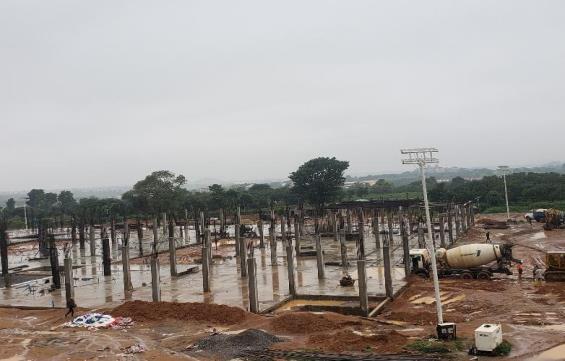






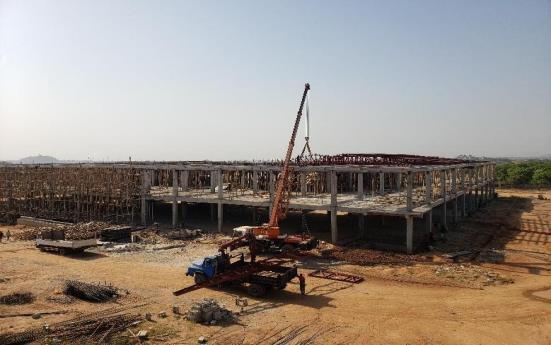
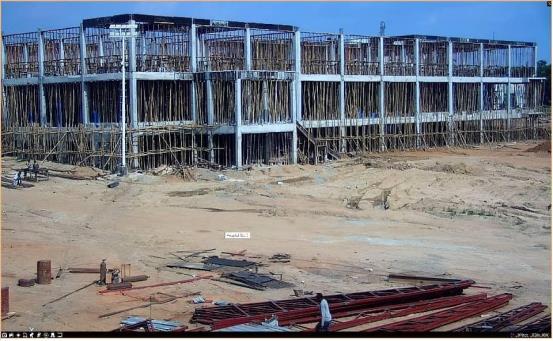
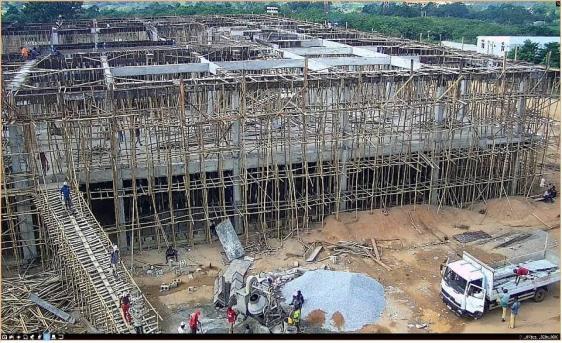
For any organization to thrive and flourish, its leadership must be right, its values must be upheld, and its institutions must be protected. These rubrics also hold true for any nation that desires social, political, and economic development. It is common knowledge that any nation with the wrong set of leaders over time is simply a disaster waiting to happen. The expected will obviously be inevitable. Nations that have consistently achieved any modicum of development and advancement in the areas of infrastructure, education, science & technology, healthcare, security, economy, etc., over time, have arguably sustainably observed these rubrics. Based on the forgoing, it may be safe to posit that any nation that fails to chart these noble parts, is most likely to fail in creating an egalitarian society and delivering the basic minimum standard of living to its citizens and residents. In this regard, the realities of most African countries have been a pathetic narrative. An elderly friend once said that one of the most prominent natural disasters known and experienced in Nigeria is bad leadership. Be that as it may, history has proven that a nation cannot give what it does not have. Since Independence in 1960, Nigeria has failed in deliberately setting up institutions whose sole aim is to train and produce citizens who would take up political leadership and governance roles in the country. The unfortunate outcome of this deficiency is the current reality where people trained as farmers, teachers, military officers, etc., who are not adequately equipped with universally acceptable political and governance leadership training, are thrown up as leaders of a very complex nation like Nigeria, and expected to exhibit the skills and competences of deliberately trained minds. The Nigerian leaders, just like most other African leaders, are simply operating within the know-hows of their training, knowledge, competences, and skills. They cannot function over and above their inherent capacities. The complexities and dynamism of Nigeria’s governance architecture are way above what the leaders thrown up by current political narratives could possibly comprehend and administer. The implication of this is that the nation’s political and economic governance fortunes may never improve, and by extension, its development and advancement may continually remain stifled. These realities could however change for the better should the Nigerian Government or private individuals decide to replicate the deliberate efforts at African Youth Leadership training initiatives ongoing in Mauritius, South Africa, and other locations on the African continent. This movement is particularly aimed at training young Africans (through specialized institutions) and equipping them with the relevant continent-specific governance skills that would ensure a complete paradigm shift from the unfortunate political, social, and economic actualities currently being experienced across the continent. These specialized institutions are built to redefine African Leadership Expectation across the continent, and on the premise that Africa’s future will be shaped by young people who commit each day to think differently, to break boundaries, and to do things in ways that are a complete departure from the old rhetoric. These institutions must be erected on the foundation that the continent’s leadership expectations must be completely re-defined and based on the understanding that the possibilities and opportunities on the continent are limitless. The leadership training programme could take the form of a Two-Year deliberately structured Postgraduate Leadership course covering areas such as Governance, Politics, African Moral Values, Development Management & Administration, e-commerce, Law, Political & Economic Diplomacy, Inter-nations Economic Networking, Security & Conflict Management, Education, Finance, and Healthcare Advancement Skills, among very many others.

These Institutions will enable lasting peace and shared prosperity by throwing up the absolute best of us, and developing, as well as equipping them as Africa’s next generation of ethical leaders. Products of these Institutions would gradually take over the Local Government administrative structures, as well as the State Government administrative set up through the nation’s existing or amended political structures. This will eventually permeate the National Assembly as well as the Presidency. In the face of proper management of these processes, within a period of twenty years, the entire governance structure of the nation would be controlled by men and women who have the right training, skills and competencies to pilot the affairs of this great nation. To achieve these however, there is the need for legislative enactments that would ensure, among others, that anyone who seeks political relevance in Nigeria must be an alumnus of any of these specialized institutions. If the previous generations got it wrong, this generation could get it right. The young people of this continent, who are not just the hope for the future, but the leaders of today, can be trained and encouraged through these specialized institutions, to dream big, take action, and change their communities. The hope for a better tomorrow still lies in Baze University’s Class 2021 and in all other young people across the continent that could help to actualize a Nigeria of our collective dreams through this proposed deliberate leadership training programme.
*Oshioreamhe AGHEDO, is a Deputy Registrar and the Dean of Students Affairs .
CAN DIGITAL TRANSFORMATION MITIGATE THE IMPACT OF COVID-19 ON EDUCATION SYSTEMS IN NIGERIA? THE CASE OF BAZE UNIVERSITY Rislan KANYA*
A Devastating Pandemic to the Education Sector
The reality between February and March 2020, was that educational institutions from the global north to south were forced to shut down operations indefinitely, as staff and students were sent home because of the raging Covid-19 pandemic. With this sudden and abrupt shut down and no end in sight in overcoming this raging pandemic, there were troubling questions: are schools going to remain shut down indefinitely? or is there an enabling environment strategy to migrate to remote teaching and learning during this unending shut down? This created the need to ask the next question: If we move to remote teaching and learning, (popularly known as online or digital learning) how ready and prepared are we to migrate students online and produce quality results that will be at par with, or better than the traditional mode?

Within the first few weeks of the shutdown, it was evident that, even the well-resourced nations in the global North, struggled to set a direction in their attempt to move teaching and learning into an online digital platform. In Africa and other developing countries, digital transformation policies and associated palliatives were hastily conceptualized, developed and rolled out within a short period with little thought on the end goals, and achievable implementation plans. This policy formulation process, in normal climes can take up to a decade from conjecture to actual delivery. In order to graduate the Covid-19 pandemic-influenced digital transformation policy, from being the usual never -ending storytelling-like-policy associated with developing countries, considerable collaborative effort was made and this has not doubt yielded good result; sadly not for all student population groups but mainly for students from upper-class income background.
Some of the digital palliatives put forth included conceptualization, design, implementation and deployment of various digital infrastructures such as cloud and mobile computing, virtual private networks and closed user group networks (for voice and data exchange), learning management software, video conferencing platforms, online digital libraries and repositories, plagiarism detection and prevention software, etc. With the implementation of these digital tools, evidence is now abounding that they are significantly reducing the brutal effects of the pandemic on education. It is pertinent to note how some low resourced Federal, State and Local government in developing countries became ingenious to resuscitate the traditional distance-learning education system using radio and television broadcast, and in some cases paper correspondence between students and teachers or the schools (as a parent, I experienced all these intervention). Also, private primary, secondary and tertiary institutions globally were not left out in the attempt to guarantee continued learning to students, maintain a steady income to service salaries and the digital infrastructure while maintaining social distancing.
Examining Sectoral Damage
My recent examination of the damage caused by the current pandemic in the education sector, indicate that about one billion students were added into the existing about 250 million out of school children as stated in the United Nation (UN) Covid-19 response documents. Further findings reveal that over 94% of children globally were out of school, and about 99% of them were from low to lower-middle-income countries. In Nigeria, the pandemic scaled up the 13.2 million existing out of school children before ethe pandemic to over 46 million as stated in a report published by School of Oriental and African Studies (SOAS). Furthermore, a report published by Save the Children states that over 9.7 million children in Nigeria post-Covid-19 pandemic may never go back to school again.
Further to this scary number as published by SOAS are two question that remains unanswered to date:
Do households have the facilities to engage their children in remote learning? Do teachers have the skills and digital facilities to deliver live lesson or record massive
open online course (MOOC) styled lesson?” While searching for answers to these questions from the SOAS Report, let me end the first part of this article by putting forth, another food for thought from the speech of the United Nation Secretary General (Antonio Guterres) at the launch of the “Save Our Future” campaign.
“Now we face a generational catastrophe that could waste untold human potential, undermine decades of progress, and exacerbate entrenched inequalities..., The decisions that governments and partners take now will have a lasting impact on hundreds of millions of young people, and on the development prospects of countries for decades to come.”
Sustainable Digital Transformation Strategy
Having laid this foundation which I believe will be useful in my story on how I led the digital transformation (DT) strategy at Baze University (where I have worked for about a decade as Director IT Services) to win a battle against the disruption that came with the Covid-19 pandemic. In the 2019 edition of the Baze Focus Magazine, I published an article titled “Digital Transformation In Higher Education: The Baze Example” and I told our readers how Baze university conceptualized, developed and implemented an inclusive, resilient and sustainable Digital Transformation Strategy. To refresh our memory, let me share George Westerman definition of Digital Transformation, which I used in that article:
George’s definition of DT is the answer to the question asked in the SOAS report and the statement of Antonio Guterres (the UN Chief) at the launch of the “Save our Future” campaign. Let me repeat DT remains one of the core solutions to numerous challenges associated with Covid-19 pandemic disruption. In the closing part of my last year’s article, I enumerated how we implemented our DT strategy and concluded the article with a hypothetical statement where I said: “digital platforms are expected to lead Baze into next level of digital transformation through the fullscale deployment of learning analyticsand other transformationinitiatives”.
Disruptive Innovation
Incidentally, in not too far time, this hypothetical statement has now become a reality and has coincided with what late Professor Clayton Christensen (author and Harvard University Professor whom I highly resect and inspired by his work “disruptive innovation” who sadly passed away early this year) predicted in 2017 that 1/3 of Colleges and Universities in the USA will be bankrupt or close by 2030. Although researches are ongoing in documenting how basic and higher education schools are affected by the current pandemic, preliminary findings have shown that many schools have closed down, bankrupt or are unable to pay salaries and support overhead cost. Also, the thirst of campus-based education is losing standing as more students are now considering enrolling into remote digital learning or online courses. Further findings on the effect of Covid-19 pandemic on education have revealed that many private schools in Nigeria fell into a full or partial bankrupt status, but for the Baze University, thanks to the foresight of our founder on investment in digital transformation at the onset. On the 19th March 2020, when the Federal Ministry of Education in Nigeria directed all schools to close operations from the 23rd of March, 2020 until further notice to reduce the spread of the pandemic, the number of emails I usually receive in personalized-official capacity, and my department ServiceDesk email increased by over 600% from staff and students. The frequently asked question was always: “how are we going to roundup the semester while maintaining physical distancing?”
Crossing the valley of death
As we continued responding to the growing volumes of emails and phones calls, on the 20th of March, I had several emergency meetings with my key staff on how to cross the “valley of death”of the Covid-19 pandemic and prepare for implementation of any outcome of the planned senate emergency meeting scheduled by the Vice-Chancellor on the 23rd of March 2020. On the 21st of March 2020, around 11:30 in the night, I received a call from the Deputy Vice-Chancellor (DVC) Administration. In normal circumstances he would send an email, a text, or a WhatsApp message outside office hours. Without any pleasantry at all, and a mouthful as I picked his call, he retorted “Rislan do you think we have the capacity to complete our outstanding 3 weeks teaching and learning online?” More than 10 seconds of silence went by without a response from me as I reflected on his question, so he repeated the question with as much urgency and relevance in his tone of voice as I have ever heard. With some courage and calculated calm, I responded to him “yes sir, we have the basic infrastructure necessary to enable us to complete the semester online, but we need total buy-in from staff and students”
As I continued discussing with the DVC on the phone, I received a notice of call-waiting from the Registrar, so I immediately alerted the DVC of this and asked if I could merge Registrar’s call knowing this was likely to be on the same issue. The DVC reluctantly agreed, and we extended the conversation and concluded with the need for me to revamp our digital transformation strategy on how to seamlessly move from brick-and-mortar teaching to digital classroom to be presented at the planned senate meeting.
In the first phase of my digital transformation strategy presentation at the Senate Emergency Meeting held on the 23rd March 2020, I identified key gaps that needed to be addressed immediately to enable us to migrate fully into remote and digital teaching and learning: 1.Weak digital literacy among staff and students. 2.Need to improve our foundational infrastructure (computing devices, power and network connections). 3.Need for our staff, students, and parents to understand why we have to adopt remote learning and digital pedagogy and their associated tools. 4.How to effectively engage, connect and collaborate with students via digital/remote instructions. 5.How to leverage on ready-made learning contents since this change occurred un-planned. 6.How to evaluate the quality and validity of assessments while examining students remotely and digitally.
The six gaps mentioned above were extensively debated, action point and implementation champions identified and appointed while Key Performance Indicators (KPIs) were set to measure implementation success/failure. The first gap was assigned to me and the Registrar, the second gap was assigned to the Pro-chancellor, Vice-Chancellor and Deputy Vice-Chancellor Administration and Director IT Services, the third, fourth, fifth and six gaps were assigned to myself, the Registrar, Director Academic Planning, Faculty Deans, Head of Academic Department (HODs), Lecturers, Faculty Officers, Students and the parents.
Sustaining Digital Capacities
Permit me to again return to my last year’s article in the Baze Focus Magazine where I enumerated how my Directory, the Directorate of Information Technology Services (DITS) within the last ten years is championing the implementation of an integrated and unified digital platform which enabled and is still enabling the digital transformation journey at Baze University.
In that article, I mentioned 12 core projects implemented, due to space constraint, I will only summarize five of the services that enable us to achieve resiliency and sustainability while experiencing the most difficult moment of our lifetime:
1.Baze University Enterprise Planning (ERP): This is a homegrown software package (conceptualized, designed, developed and maintained in-house) that is core to all our operations. This ERP handles and supports our end-to-end operations and workflow (application, admission, enrolment, registration, staff and students attendance and monitoring to ensure compliance with business rules, examination governance, management and processing, Key Performance Indicators (KPIs) and quality assurance, Staff and Students evaluation, library, timetabling and calendaring, payments and collections, human resources management, alumni relations, library and resource management and also support business intelligence, and other numerous operations) 2.Google workspace: An integrated cloud computing platform that enables real-time, seamless and simple connection, collaboration and facilitation between staff and students and parents. This service has been in operations at Baze since inception and is central to our operations, some of the key tools and benefits we derive from this platform include: a.Institution-wide email for one to one and one to many communications b.Personalized and shared calendars for scheduling and reminders c.Learning management software (LMS) for digital pedagogy, curriculum and contents development and sharing, management of assignments and feedback d.Video and voice conferencing application for Realtime face-to-face lecturers (video, audio and screen sharing), tutorials, projects briefing and meetings and also for recording the real-time face to face lectures. e.Documents management (Folders, Slides, Spreadsheet and word processing) for creating and co-creating, folders and files, and edit in real-time f.Forms for creating surveys and quizzes, assessments and final examinations 3.Online digital contents and resources running on digital catalogue, databases and repositories such as koha, DSpace, Law Pavilion, Lexis and Nexis, eGranary, EBSCOhost, IEEE Xplore, eGranary, MIT Open Courseware, EDX, Coursera, etc. 4.Digital and cloud-based laboratories for simulation and modelling (Oracle, IBM, Cyberoam, Cisco, Panasonic, Microsoft, Adobe, Matlab, Maya, Google cloud, Google Sketch, Petex, etc.) 5.Turnitin plagiarism detection software to detect and reduce plagiarism and also improve academic integrity
Full implementation and adoption of the above tools and other tools, not listed have enabled Baze University to experience zero disruption of academic activities, recruit two cohorts of new students and also scale up its digital transformation agenda. This leads naturally to a sporadic increase in the utilization of our digital platforms and digital literacy competencies among staff and students as seen from usage analytics in the following pictures. This usage analytics and associated evidence from our learning analytics and user access analytics derived from our data-lake (data from digital classrooms, recordings from the video conferencing meetings, plagiarism detection software reports, google drives and docs, and from our ERP) reveals over 1000% increase in the utilization of our digital services among staff and students since April 2020.
Fig. 1: Email utilization analytics Fig. 2: Drive & documents utilization analytics
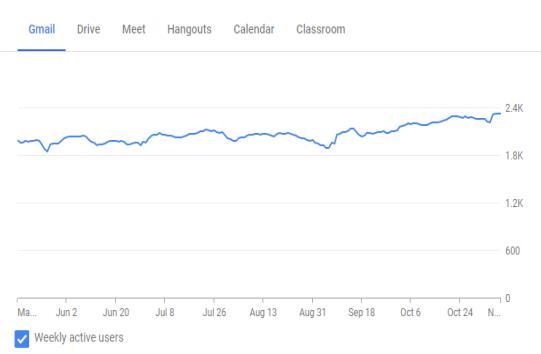
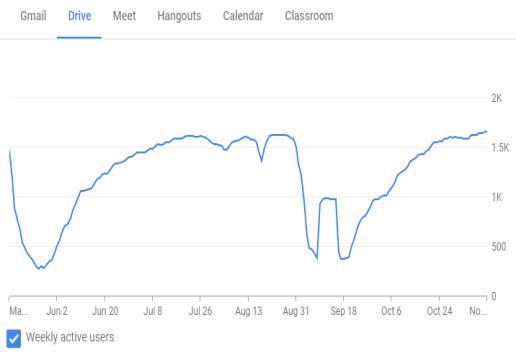
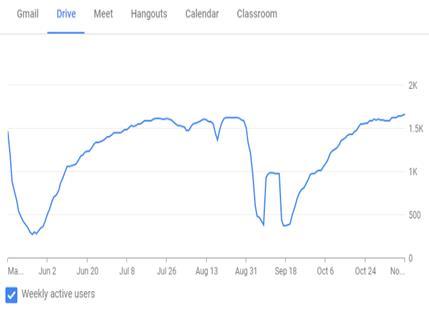
Fig. 3: Video conferencing application utilization analytics. Fig. 4: Digital Classroom Utilization Analytics
Future Plans
Further analytics reveals many improvements in both our core and support operations (planning and timetabling, progression, and registration, continues and final assessments workflow, student’s payment and collections, evaluations and management of KPIs, among other numerous operations). For example, the number of registration, progression and post examinations and continuous assessments complaints dropped to over 600% because of seamless and enhanced real-time online/off-campus workflow that eliminated human mediation.
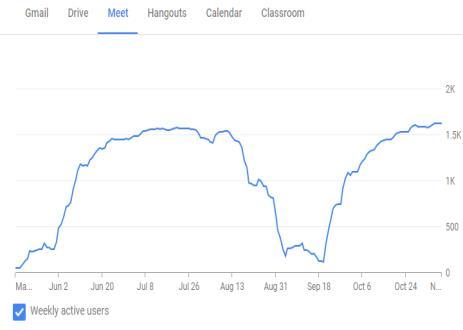
As the pandemic continues, we need to investigate the future, adjust to the new normal and plan for possible threats, evaluate the efficiency and efficacy of our digital transformation strategy, build more sustainable and resilient digital infrastructure and invest more in digital literacy and capacity development. We also need to invest more on standard digital curriculum development, grow contents creation and development and evaluate digital pedagogy and methodology to support a critical graduate mass that can compete in the future already dominated by Artificial Internet of Things (AIoT) and other computer-mediated intervention. Lastly, we also need to look at the recent interventions in the digital transformation beyond the current pandemic but as part of our integral future action plan that complements the traditional face to face teaching and learning.
*Dr. Rislan Abdulazeez KANYA, MBCS, CITP, MCPN, MNCS, SMIEE is the Director IT Services
1.0 INTRODUCTION:
In the October 2019 edition of this magazine, we reported the commencement of postgraduate programmes at the University. We named the thirteen (13) programmes approved for the University by the National Universities Commission (NUC), the admission requirements and duration of each programme. About a year now after that publication, we are delighted to report the progress we have made so far in implementing the approved programmes.

2.0 THE NUMBERS:
We started with four (4) programmes in the 2018/2019 academic year with twenty-two (22) registered students out of the forty-one (41) we offered provisional admission. The programmes were MSc Management, MSc International Relations & Diplomacy, MSc Mass Communications and Master of Business Administration (MBA). Four (4) students of the one-year MSc International Relations & Diplomacy programme obtained their degrees at the 6th Convocation ceremony of the University that took place on October 26th, 2019. In the forthcoming 2020 graduation exercise, most of the pioneer students in the MSc and MBA programmes will receive their degrees. Meanwhile, in the current 2020/2021 academic year, we have given provisional admission to 55 students to bring the total number of PG students to 205. The growth in PG student population is remarkable, thanks to the support of the Pro-Chancellor/Chairman of Council, Senator Y.D. Baba-Ahmed (PhD), who has been willing to fund advert programmes on radio and television, including the current advert on DSTV for the University.
3.0 MASTER OF LAWS PROGRAMME:
The Postgraduate School commenced the Master of Laws (LLM) Programme during the 2019/2020 academic year. The mission of the programme is to offer quality and competitive graduate legal education which prepares students for value-added legal practice as well as helping them to contribute towards resolving our challenges of development and governance. The programme runs for 12 calendar months and has been hugely popular with legal practitioners, law makers and fresh graduates. Admission is open to applicants with bachelor of laws (LLB) degree from approved universities with a minimum of second class honours (Lower Division).
4.0 NEW PhD PROGRAMME:
Having graduated two sets of MSc students, the University was poised to offer its first doctoral programme. That came from the Department of Business Management in the Faculty of Management and Social Sciences. The PhD programme in Management was approved by the University Senate on 11th September 2020 after a careful consideration by the Postgraduate Board. The mission of the programme is to produce high-quality graduates who possess relevant theoretical, practical, managerial and research skills for the business world and academia. The 3-year programme is intended for outstanding MSc and MBA graduates in Management.
5.0 CLASSIFICATION OF MSc DEGREES:
It is now accepted practice in many academic jurisdictions, particularly in the United Kingdom, to classify MSc degrees. This is done to encourage excellence in the pursuit of the degree. Baze University Senate considered a proposal from the Postgraduate Board on the classification of future University MSc degrees into Distinction, and Merit, depending on the performance of the graduates as will be evident in their Cumulative Grade Point Average (CGPA) and the quality of their MSc thesis. It was believed that this initiative will encourage seriousness and competition among students in the PG programmes.
6.0 TUITION SCHOLARSHIPS:
On the 17th January 2020, the Director of Corporate Services of the University, Khalifa U. Mohammed announced a tuition scholarship award to Ms. Rabi Bello Mohammed (BU/19C/PGS/4021). The award was graciously made by Senator Y.D. Baba-Ahmed (PhD), the Pro-Chancellor/Chairman of the Governing Council of the University, to Ms. Rabi Mohammed to assist her in completing her MSc programme in International Relations & Diplomacy. Also, as part of the corporate social responsibility of the University, the Pro-Chancellor/Chairman of Council approved a fifty percent reduction in postgraduate fees to officers of the Economic & Financial Crimes Commission (EFCC). In a letter dated 27th August 2019 to the Acting Chairman of the EFCC by the Vice Chancellor of the University, Prof. Tahir Mamman (OON, SAN), the tuition reduction was intended to “encourage officers to pursue capacity building to enhance job performance”.
7.0 STAFF TURNOVER AT PG SCHOOL:
The pioneer Secretary of PG School, Ms. Ummul-Khair Abubakar made way for Mr. Usman Sani Dakyes. Ms. Abubakar had since resumed duty as Head, Exams and Records Unit of the Registry. The PG School wishes her the best of luck in her new sensitive assignment. We have no doubt that she will excel in the new post given her dedication to duty. We also take this opportunity to welcome Mr. Dakyes to the PG School.
8.0 CONCLUSION:
It is noteworthy that despite the COVID-19 epidemic, the PG programmes at the University have continued to attract many students. From a modest number of 41 admissions at inception to the current 205 admissions, the programmes have grown remarkably, thanks to the Pro-Chancellor, University Management, Deans, Heads of Departments and PG Lecturers who have supported the programmes. The programmes have attracted graduates from diverse universities in the country and more especially Baze University graduates. In this connection, we welcome the University’s best graduating student of 2019 convocation, Mr. Anthony Ekpo Okon, who has returned to register for his MSc in Economics. It is expected that the new PhD programme in Management will challenge other qualified departments to follow suit with their doctoral programmes. That way, the PG School will continue to grow from strength to strength.
* Professor Peter UMOH (PhD, Fcib) is the DVC Academic and Dean, Post Graduate School.










